

Politicians, Jewish leaders respond to Operation Rising Lion

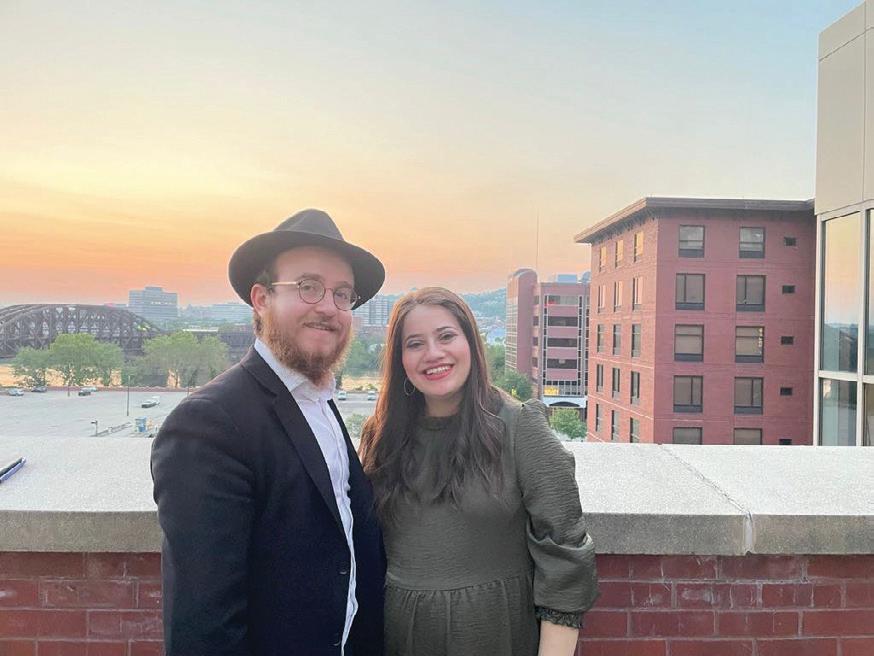

By David Rullo | Senior Sta Writer



Elected representatives and local leaders were quick to react to Israel’s preemptive strike against Iran’s nuclear facilities, ballistic missile bases, military commanders and nuclear scientists.
With the launch of Operation Rising Lion on June 13, three of Iran’s top figures were killed —Major General Hossein Salami, Islamic Revolutionary Guard Core Commander; nuclear physicist and university head Mohammad Mehdi; and Fereydoon Abbasi, former nuclear program chief.
The operation included dozens of locations across Iran, inflicting severe damage to key nuclear sites and military installations.
Iran responded with missile and drone attacks targeting Tel Aviv, Jerusalem and Haifa, among other locations across Israel.
As of press time, Iran had launched some 350 ballistic missiles, the vast majority of which were intercepted, according to IDF statistics released Monday.
In all, 24 Israelis had been killed in Iran’s ballistic missile attacks as of press time.
Shortly after Operation Rising Lion began, Pennsylvania’s Sen. John Fetterman wrote on X:
“Our commitment to Israel must be absolute and I fully support this attack. Keep wiping out Iranian leadership and the nuclear personnel. We must provide whatever is necessary—military, intelligence,
weaponry—to fully back Israel in striking Iran.”
In April Fetterman, a staunch supporter of Israel, told the Washington Free Beacon that he didn’t think negotiations with Iran would work, saying that the Islamic Republic “has been destabilizing the region for decades.”
“We have an incredible window, I believe, to do that, to strike and destroy Iran’s nuclear facilities,” he said.
After the launch of Operation Rising Lion, Fetterman told Jewish Insider that he was shocked by the response of some of his Democratic colleagues.
“It was just astonishing to see colleagues criticizing these things. It’s like, do you think you can negotiate with that regime? Do you think you want to run that scenario and allow them to acquire 1,000 pounds of weapons grade uranium? I can’t understand, I can’t even begin to understand that,” he told JI.
In the same interview, Fetterman pointed to Iran’s support of terrorist organizations Hamas, Hezbollah and Houthis.
Fetterman told JI that Israel’s ability to target specific people was “remarkable.”
“It’s like Beepers 2.0,” he said, referencing an Israeli operation that sold Hezbollah beepers containing explosives, which were detonated in Syria and Lebanon on Sept. 17 and 18.
JCBA’s youth engagement brings new life to sacred spaces
By Adam Reinherz | Senior Sta Writer
The first visit to a cemetery shouldn’t be to bury Bubbie. At least that’s how Kelly Schwimer sees it. Since taking the helm of the Jewish Cemetery and Burial Association 18 months ago, Schwimer has helped strengthen the organization’s operations, raised thousands of dollars in grants and donations, and worked to increase its profile, especially among the young.
The latter, she said, reflects a deliberate effort to not only bolster JCBA and demystify death but ensure a promising future for the region.
Most children — let alone most people — don’t envision career paths involving cemetery work; still, keeping these places cared for with “dignity for perpetuity, means the work must start now, and we need to get our Jewish youth to understand their role,” she said.
During the past year, Schwimer and other stakeholders have focused on improving internal systems while developing age appropriate ways to boost interest in burial work.
Haliel Selig, regional director of Keystone Mountain Region BBYO, brought several teens to a cemetery months ago where JCBA staffers had orchestrated a meaningful cleanup activity.
“I was really blown away by what Kelly and her staff were doing,” Selig said.
Volunteers, ranging in age from teens to college-aged students, learned about the space, “shoveled gravel, just got their hands dirty, and with no complaints, all smiles,” Selig said. “It was so inspiring to me to see our next generation care about the previous generations.”
Creating reverence and connectedness is the heart of JCBA’s efforts, Schwimer explained.
“These cemeteries are enriched with history — family history, city history, people’s history — that remains unknown to most,” she said. “If we start by promoting the history in a cemetery, the traditions and rituals will follow.”

Coming June 27
New exhibit at Rodef Shalom
Photo courtesy of Israel Defense Forces
Teenager Eva Friedlander heads to peace camp to bridge divides and build dialogue
By Adam Reinherz | Senior Staff Writer
ASquirrel Hill teen is going to camp to discover how to get along with others. For three weeks this July, Eva Friedlander will live among Israelis, Palestinians, Indians, Pakistanis, Americans and Brits at Seeds of Peace Camp in an effort to better appreciate conflict resolution. Eva, 15, described the Maine-based summer camp as both an “isolated community” and an “experiment of what society can be.”
Campers, who range in age from 14-17, spend the summer trying to build “successful relationships,” Eva said. “And even if they’re not always successful, each person still leaves feeling like they can have a connection with the other person.”
The Shady Side Academy student, who will be in 11th grade next fall, said her interests in theater and international relations — given their reliance on “using dialogue to create positive interactions between people” — spurred her summer pursuit.
The camp, she continued, enables participants to talk, connect and see others not “just as a Palestinian or an Israeli, but as humans with much more in common than their national identities but still not forgetting about those national identities.”
Seeds of Peace was established in 1993. Camp materials state that following that first summer — during which 47 Israeli, Palestinian, Egyptian and American teens attended camp — campers were invited by then-President Bill Clinton to attend the signing of the 1993 Oslo Accords between Yitzhak Rabin and Yasser

“Obviously not everyone can spend three weeks going to a summer camp in Augusta, Maine, but learning conflict resolution is pretty accessible.”
– EVA FRIEDLANDER
Arafat on the White House lawn.
Eva said she’s “always been interested in the conflict,” though recent events have sparked new desires for greater understanding.
“The connection to Israel, as a Jew, was kind of something that I grew up with,” she said.
Whether during religious school or services at Rodef Shalom Congregation, Eva said she addressed Israel through prayer. “The concept of Israel was always just like a part of my life — I have family that lives there.”
After Oct. 7, 2023, she began thinking more intensely about the region and her relationship to its residents.
“In society, it’s hard for us to see things as being in a gray area,” she said. “I can be a Zionist, I can be pro-Israel and I can also be pro-Palestine, but society doesn’t want to recognize all of these things to be true. I think at Seeds of Peace, that’s something that can be true. We’re not just viewing each other as one thing. We’re viewing each other as

SUBSCRIPTIONS
subscriptions@pittsburghjewishchronicle.org 412-687-1000, ext. 2
TO ADVERTISE advertising@pittsburghjewishchronicle.org 412-687-1000, ext. 1
EDITORIAL DEPARTMENT
Email: newsdesk@pittsburghjewishchronicle.org
BOARD OF TRUSTEES
Evan H. Stein, Chair
Evan Indianer, Vice Chair
Derek Smith, Treasurer
Gayle R. Kraut, Secretary
Gail Childs, Dan Droz, Malke Steinfeld Frank, Seth Glick, Tammy Hepps, Judith Kanal, Cátia Kossovsky, Charles Saul
GENERAL COUNSEL
Stuart R. Kaplan, Esq.
multifaceted people.”
Reaching that conclusion requires work, she explained.
As a lead-up to the summer, Eva and fellow campers from the U.S. and the U.K. participated in several Zoom sessions where facilitators stressed the importance of paying attention.
Through monthly meetings Eva has realized it’s “important to go into things wanting to learn more, not necessarily to have a response to what someone’s saying but just to listen,” she said. “At a certain point, conversations can only get so far if someone’s only listening to prove their point and not actively listening to what the other person says. I oftentimes find myself doing this when I am having a conversation with someone that could be under the umbrella of stated debate — I’m listening to what they’re saying, so maybe I can trip them up in a phrase they said or pick apart one of their points — when it would be so much more successful if I just listen to understand where that person is coming from.”
Eva acknowledged the privilege she has this summer, but is confident that even those without access to the camp can still achieve positive outcomes.
“Obviously not everyone can spend three weeks going to a summer camp in Augusta, Maine, but learning conflict resolution is pretty accessible,” she said. “Applying small things daily, like that active listening I talked about, and not viewing conversations as an argument to win but a dialogue to understand, is another small thing that can be applied to day-to-day life.” PJC
Adam Reinherz can be reached at areinherz@pittsburghjewishchronicle.org.
5915 Beacon St., 5th Floor Pittsburgh, PA 15217
Main phone number: 412-687-1000
Subscriptions: 412-687-1000, ext. 2
Jim Busis, CEO and Publisher 412-228-4690 jbusis@pittsburghjewishchronicle.org
EDITORIAL
Toby Tabachnick, Editor 412-228-4577 ttabachnick@pittsburghjewishchronicle.org
Adam Reinherz, Senior Staff Writer 412-687-1000 areinherz@pittsburghjewishchronicle.org
David Rullo, Senior Staff Writer 412-687-1000 drullo@pittsburghjewishchronicle.org
Andrew Rich, Staff Writer arich@pittsburghjewishchronicle.org
ADVERTISING
Amy Weiss, Account Executive (412) 613-0697 aweiss@pittsburghjewishchronicle.org
PRODUCTION
Jeni Mann Tough Production Manager Carl Weigel Art/Production Coordinator Subscriptions subscriptions@pittsburghjewishchronicle.org 412-687-1000, ext. 2
Published every Friday by the Pittsburgh Jewish Publication and Education Foundation 5915 Beacon St., 5th Floor Pittsburgh, PA 15217
Phone: 412-687-1000
POSTMASTER: Send address change to PITTSBURGH JEWISH CHRONICLE, 5915 BEACON ST., 5TH FLOOR PITTSBURGH, PA 15217 (PERIODICAL RATE POSTAGE PAID AT PITTSBURGH, PA AND AT ADDITIONAL MAILING OFFICES) USPS 582-740
Manuscripts, letters, documents and photographs sent to the Pittsburgh Jewish Chronicle become the property of this publication, which is not responsible for the return or loss of such items.
The Pittsburgh Jewish Chronicle does not endorse the goods or services advertised or covered in its pages and makes no representation to the kashrut of food products and services in said advertising or articles. The publisher is not liable for damages if, for any reason whatsoever, he fails to publish an advertisement or for any error in an advertisement. Acceptance of advertisers and of ad copy is subject to the publisher’s approval. The Pittsburgh Jewish Chronicle is not responsible if ads violate applicable laws and the advertiser will indemnify, hold harmless and defend the Pittsburgh Jewish Chronicle from all claims made by governmental agencies and consumers for any reason based on ads appearing in the Pittsburgh Jewish Chronicle

p Eva Friedlander is spending the summer learning conflict resolution. Photo courtesy of Eva Friedlander
Headlines
Mexican War Street resident targeted with antisemitism — again
By David Rullo | Senior Staff Writer
Deena Blumenfeld spent June 15 the way many people spend a typical Sunday — sitting outside her house talking with neighbors. Blumenfeld and her friends, though, had a more serious purpose than simply sharing conversation, a cold brew or some barbeque passed between the hedges.
For more than two weeks, Blumenfeld’s home security cameras captured the same person walking past her house and spitting on the Israeli flag planted in her yard.
The Mexican War Streets resident said the first incident occurred on May 29 and she witnessed it in person.
“I watched a guy walk up to my house, spit on my flag and keep walking,” she recalled. “I opened my car door to yell at him — you can hear me yelling on the video, ‘What are you doing, that’s my house.’ He just kept walking and gave me the finger.”
When Blumenfeld asked the perpetrator to stop and talk with her he gave her the finger again and continued on his way.
The spitter continued to make appearances, vandalizing Blumenfeld’s flag at least six more times.
When Blumenfeld’s neighbor saw the man spit on the flag, they yelled at him. Rather than slink away into the darkness, the spitter swore at the neighbor and continued on his way.
Blumenfeld said the perpetrator is intentional in his actions and has no shame.
“He comes from different directions. He comes from up the street, down the street, from the alley next to my house. He did it twice one morning on his walk to the coffee shop,” she said.
This isn’t the first time Blumenfeld has dealt with antisemitism.
A little more than a year ago, the home she shares with her husband was vandalized several times — an Israeli flag was pulled from the ground and thrown in a nearby garbage can, anti-Israel flyers were left at their house, the words “We demand blood,” and “For Blood and Soil” were painted on another flag and the sidewalk outside their house.
Police eventually arrested the person they believe stole her flags but have yet to identify the person or people who painted the graffiti.
The prior acts of antisemitism motivated her to install the enhanced camera that could capture the spitter each time he vandalized her flag.
Recording images of the person, though, doesn’t necessarily make Blumenfeld feel more secure.
“This is obviously stalking and harassment,” she said, “and this is one of the many concerns with his activities. And the police have the same concern.”
Her worry is that the person spitting on her flags could escalate his behavior.
Because of her previous experiences with antisemitism, Blumenfeld knew how to handle the situation and took her concerns
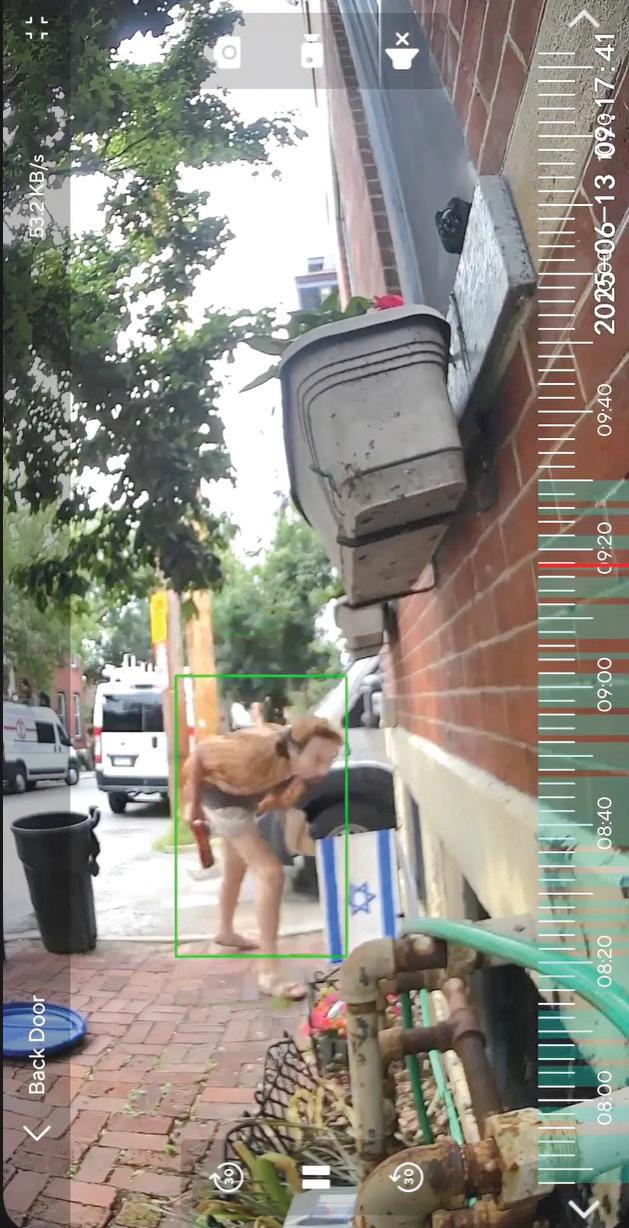
to the local police, the Jewish Federation of Greater Pittsburgh and social media, where she documented the vandalism and harassment by the person spitting on her flag.
On June 14, Blumenfeld received a Facebook message from a neighbor voicing outrage at what had been taking place and offering to sit outside and wait for the spitter in the interest of community safety.
The following day several neighbors took their morning coffee outside, chatted and waited. It didn’t take long before someone matching the look of the spitter was spotted.
“The perpetrator came walking down the alley and turned as if he was coming to my house,” she said. “My friend’s chair was close to the corner, and he saw her and turned on his heel to go the other direction.”
The neighbor yelled “Good morning” and called the perpetrator by name. It turns out that he lives nearby and was known by some of residents of the community.
“He gave her a nasty look. I said, ‘Come talk to us,’ but of course he wouldn’t,” Blumenfeld said.
The spitter walked to a nearby coffee shop and then sat in a nearby parklet. He made one more pass near Blumenfeld’s house when he thought no one was there but returned to the coffee shop once he realized people were still watching him.
Blumenfeld called the police while the group fanned out in case the suspect tried to leave.
When a uniformed officer confronted the suspect, he admitted to spitting on the flag and gave his name and address, according to Blumenfeld.
“He called the Israeli flag a hate symbol and said that’s why he did it,” she said.
Because they didn’t catch him in the act of spitting, the officers were unable to arrest the suspect but took a report. Blumenfeld believes he will be arrested soon.
Undeterred in his feelings, Blumenfeld said that as the suspect left the scene, he took the opportunity to give the group the finger one last time.
“He’s so brazen, he doesn’t care,” she said.
Blumenfeld didn’t let his attitude spoil her day, which happened to be her anniversary.
“When it was over we went and had some cookies,” Blumenfeld said. “My husband made some chocolate chip cookies.”
Still, the incidents of the last year have given Blumenfeld, who identifies as liberal on most issues, pause.
“I’m a registered Democrat. I’m a liberal. I do not like what the current Trump administration is doing. I have a No Kings button sitting in my purse, but I couldn’t go to the protests because I didn’t feel safe. I’m on the same page as those people with 90% of the issues but this one thing gets in the way and now we’re stuck and I am not part of the group anymore,” she said.
And that is a hard pill for Blumenfeld to swallow.
“It’s disheartening and depressing,” she said. “I feel guilty I wasn’t downtown on Saturday, but I don’t feel safe and that’s part of the reason my flag is there, because there are Jews in the neighborhood.”
Blumenfeld said some people have advised her to remove the flag or put it in different place. She said that’s akin to asking a girl to wear longer skirts so she won’t be raped. She’s been lucky, she noted, to have the support of a community that may not agree with her on Israel, but gets it.
“A woman walked past who said, ‘I don’t support what’s going on, but I realized if it was my Pride flag and someone spit on it, I’d want help, too,” Blumenfeld said.
Shawn Brokos, Jewish Federation of Greater Pittsburgh community security director, said community support is important.
“It’s the idea of the old-fashioned neighborhood watch where everyone in the community looks out for one another and if they see something suspicious, they share it amongst themselves and the police,” she said.
That power, she said, was shown in this instance.
“That’s how this individual was identified,” Brokos said. “Neighborhood people saw him do it, someone recognized him and that’s what led to the police identification.”
Brokos urged anyone who notices anything suspicious to report it to law enforcement and the Federation at jewishpgh.org/form/ incident-report. PJC
David Rullo can be reached at drullo@ pittsburghjewishchronicle.org.

Lee Oleinick
Financial Advisor
Managing Director–Wealth Management lee.oleinick@ubs.com
Jack Greenberg
Financial Advisor Vice President–Wealth Management jack.greenberg@ubs.com
Christopher Butsko
Financial Advisor
Senior Vice President–Wealth Management christopher.butsko@ubs.com
Brandon Pruss
Financial Advisor Vice President–Wealth Management brandon.pruss@ubs.com
p Deena Blumenfeld’s home cameras captured an image of the person who has spit on her Israeli flag several times. Photo courtesy of Deena Blumenfeld
Headlines
Composting creates opportunities for renewable growth at Pittsburgh synagogues
By Adam Reinherz | Senior Staff Writer
At some Pittsburgh synagogues, optimizing a spiritual home means looking in the trash.
Since last summer, Congregation Beth Shalom members have worked with congregational leaders to reduce the amount of waste created during synagogue-related events.
Shari Woldenberg, Derekh coordinator at Beth Shalom, said the effort began after several congregants who had scheduled bar and bat mitzvahs at the Squirrel Hill synagogue asked about composting, a process that protects the climate by reducing waste and methane emissions from landfills.
Before members’ requests, Beth Shalom had operated similarly to many large institutions: Events were held, trash was collected and the cycle repeated.
Woldenberg said she was curious about the families’ request and investigated the matter.
What she discovered, she continued, was that — whether during a Saturday morning kiddush or any other event with food — the congregation relied on “big black bins” lined with single-use plastic bags to contain all its refuse. Various items were disposed of, with little regard for what was collected or where it went.
That process didn’t need to continue, she said.
Woldenberg and other synagogue members requested a grant from Beth Shalom’s board to support a temporary composting program.
Synagogue leadership provided the applicants with $1,000, Woldenberg said. Since receiving those funds — which cover about six months of composting costs at Beth Shalom — waste has decreased.
Every Wednesday, a composter comes to the building and collects a can full of compost-friendly plates, cups and cutlery mostly collected from each week’s kiddush. The big green bin of items is taken to a pit where the used goods break down, Woldenberg said.
The effort, she continued, ensures waste doesn’t end up in a landfill.
Beth El Congregation of the South Hills follows a similar process to get the same results.



Whether following a Shabbat kiddush or other synagogue event with food, Beth El members collect kitchen scraps, compostable paper goods, cutlery, paper -
ited, with regular pickups ensuring the materials are appropriately hauled away,

Beth El isn’t new to the process. The suburban synagogue “has been composting since 2014 as part of an ongoing greening initiative,” Benton said. ”Donations to the congregation’s Greening Fund help to offset the cost.”
Drew Barkley, executive director of Temple Sinai, said that although Temple Sinai doesn’t currently compost he’s hoping the situation changes.
As the Squirrel Hill synagogue continues its unification process with Rodef Shalom Congregation in Shadyside, composting remains on Barkley’s list of projects to explore.
“About a year and a half ago when it became possible that we are moving buildings and having a little larger staff, I thought it would be a good time to reimagine the possibilities of doing all the things that we are not doing now,” he said. “We want to institute more programs here that are better for the earth.”
Barkley’s passion for the project reflects a larger objective.
“We are trying to broaden and serve the greater Jewish community,” he said. “This is something we definitely want to do. We want to implement a more organized and more structured recycling program, and we want to do the same thing with produced waste.” PJC
Adam Reinherz can be reached at areinherz@pittsburghjewishchronicle.org.
According to Chris Benton, Beth El’s exec “sunshine and rainwater.”
Photo by Victor Moragriega via Pexels
Photo by Mark Stebnicki via Pexels
Headlines

celebrate culture and community

By Andrew Rich | Sta Writer
Chabad of the South Hills is hosting its first-ever Jewish Festival on Sunday, June 22 — a family-friendly celebration of Jewish culture, tradition and community open to all residents of the South Hills and beyond.
The festival will be held at Chabad’s Bower Hill facility on Sunday, June 22, from 1 to 4 p.m.
said. “This is a great way to come for a fun, light summer afternoon, where you get to meet people from the Jewish community, the wider community, and just see some of our culture.”
Planning for this event began several months ago with the Rosenblums taking inspiration from similar festivals in other cities around the United States.
“We’ve heard of them, and so we thought that would just be really nice to bring to our city,” Hindy Rosenblum said..
While this is the first event of its kind in the South Hills, the Rosenblums said,
“This is a great way to come for a fun, light summer afternoon, where you get to meet people from the Jewish community, the wider community, and just see some of our culture.”
–HINDY ROSENBLUM
The festival, which organizers say is the first of its kind in the South Hills, will include live music, a fun zone for kids, kosher wine tasting and food, a petting zoo and much more.
“We’re trying to make it an event … not only for Jews, but for Jews especially, to come out and feel proud to be Jewish in a fun and exciting and educational way,” Rabbi Levi Rosenblum said.
Since becoming a part of the Chabad of the South Hills’ leadership team, Rosenblum and his wife, Hindy Rosenblum, have directed all children, youth/teen and family programming.
The Rosenblums, who are coordinating the festival, said it’s geared toward people of all ages.
Levi and Hindy Rosenblum both emphasized the desire for the festival to draw the wider Pittsburgh community, not just the South Hills, and not just Jewish residents. They hope the event can help showcase Jewish culture in a positive light.
“There’s a lot of …misconception of Jews and who we are,” Hindy Rosenblum
there is no intention of it being the last. The amount of interest flooding in about the festival has sparked hope that it could be an annual occurrence.
The festival is being held at Chabad of the South Hills’ new building, 1700 Bower Hill Road, which the organization purchased in early 2024.
Levi Rosenblum discussed plans to eventually move all operations of the Chabad of the South Hills from its current facility on McFarland Road to the new location.
“For now, we pretty much have moved everything over there, except for services on Shabbat,” he said, adding that he expects all programming, including religious services, to be moved to the new location within two to three years
Tickets for the festival are free and can be acquired on the Chabad of the South Hills’ website, chabadsh.com At the event, food, drinks and other items will be available for purchase. PJC
Andrew Rich can be reached at arich@ pittsburghjewishchronicle.org.


Bespoke IT Solutions



— LOCAL —
Rabbi Levi and Hindy Rosenblum
Photo courtesy of Hindy Rosenblum
Calendar
Submit calendar items on the Chronicle’s website, pittsburghjewishchronicle.org. Submissions also will be included in print. Events will run in the print edition beginning one month prior to the date as space allows. The deadline for submissions is Friday, noon.
FRIDAYS, JUNE 20, JULY 18, AUG. 22
Gather in Rodef Shalom’s Biblical Garden for a 20s and 30s Kabbalat Shabbat. Get to know other young Jewish professionals and close out the week with apps, wine and great company. Registration required. 7 p.m. 4905 Fifth Ave. rodefshalom.org/ lateshabbat.
Join Chabad of the South Hills for Baby Loves Shabbat, music and movement for ages 0 to 3. Challah making and Shabbat songs. 3:45 p.m. 1701 Bower Hill Road. chabadsh.com.
Zionist Shabbat is a pre-Shabbat soiree with the goal of bringing together Pittsburgh’s young adult (aged 22-44) community to celebrate our shared love and support for Israel. Israeli hors d’oeuvres and wine will be served. Joined by Amy Albertson, a social media star and Israel and Jewish advocate who excels in speaking about Israel, Jewish pride and combatting antisemitism. $18. 6 p.m. Jewish Community Center of Greater Pittsburgh, 5738 Forbes Ave. jewishpgh.org/event/zionist-shabbat.
SUNDAY, JUNE 22
Join Chabad of the South Hills for the South Hills Jewish Festival. Enjoy cultural crafts, kosher wine tasting, a kosher BBQ and fun zone. 1 p.m.
1700 Bower Hill Road. Free tickets available at chabadsh.com/festival.
SUNDAYS, JUNE 22–DEC. 28
Join Chabad of Squirrel Hill for its Men’s Tefillin Club. Services and tefillin are followed by a delicious breakfast and engaging discussions on current events. 8:30 a.m. 1700 Beechwood Blvd. chabadpgh.com.
MONDAYS, JUNE 23–SEPT. 29
Join the 10.27 Healing Partnership for Roll for Insight: Community-Building Role-Playing Games. Meet every other week to connect and grow with new friends through playing tabletop role-playing games designed to inspire emotional depth. They will use RPGs to explore the intersection of identity, emotional resiliency and games to fight isolation and disconnection, and to meet new people and form friendships. Free. No experience required. 16 and up. 5:30 p.m. Jewish Community Center, 5738 Forbes Ave. 1027healingpartnership. org/rpg-club.
MONDAYS, JUNE 23–DEC. 29
Join Congregation Beth Shalom for a weekly Talmud study. 9:15 a.m. For more information, visit bethshalompgh.org.
Join Temple Sinai for an evening of mahjong every Monday (except holidays). Whether you are just starting out or have years of experience, you are sure to enjoy the camaraderie and good times as you make new friends or cherish moments with long-term pals. All are welcome. Winners will be awarded Giant Eagle gift cards. All players should have their own mahjong cards. Contact

Susan Cohen at susan_k_cohen@yahoo.com if you have questions. $5. templesinaipgh.org.
WEDNESDAYS, JUNE 25–JULY 29
Temple Sinai’s Rabbi Daniel Fellman presents a weekly Parshat/Torah portion class on site and online. Call 412-421-9715 for more information and the Zoom link.
Bring the parashah alive and make it personally relevant and meaningful with Rabbi Mark Goodman in this weekly Parashah Discussion: Life & Text 12:15 p.m. For more information, visit bethshalompgh.org/life-text.
WEDNESDAYS, JULY 2–SEPT. 3
Join Rodef Shalom Congregation for Biblical Garden Open Door Tours: free, docent-led tours of the congregation’s Biblical Botanical Garden the first Wednesday of the month. 12:15 PM. Free. 4905 Fifth Avenue. rodefshalom.org/garden.
THURSDAYS, JULY 3–JULY 31
Are you looking to incorporate mindfulness into your routine and make meaningful connections
Calling all chefs!
Do you have a tried-and-true dish that comes with an interesting origin story? If so, we want to hear from you!
Submit recipes along with their backstories to newsdesk@pittsburghjewishchronicle. org, and write “Recipe” in the subject line. Please include a photo of the dish. You may see your submission as part of our column “Savoring Stories”! PJC
with others? Join the 10.27 Healing Partnership for Open Morning Meditation. Engage in individual, quiet meditation for approximately 20 minutes, followed by approximately 20 minutes of group reflection, thoughts and warm community-building. Free; all experience levels, no registration required. 8 a.m. Jewish Community Center of Greater Pittsburgh, 5738 Forbes Ave., Room 316. 1027healingpartnership.org/openmorning-meditation.
TUESDAY, JULY 22
Young children and their grown-ups are invited to join Rodef Shalom librarian Sam Siskind for a story in the Biblical Garden, followed by a crafty activity. 1:15 p.m. rodefshalom.org.
MONDAY, JULY 28
Join Zionist Organization of America for the Kandy Ehrenwerth Memorial Lecture featuring Mitchell Bard presenting “American Colleges and Universities are Selling Out to Middle East Oil Money.” 7 p.m. Free, but reservations are required at pittsburgh@zoa.org. Jewish Community Center of Pittsburgh. PJC










Join the Chronicle Book Club!
The Pittsburgh Jewish Chronicle invites you to join the Chronicle Book Club for its June 29 discussion of “My Father’s Paradise: A Son’s Search for His Family’s Past,” by Ariel Sabar. e author will join us for part of the meeting. is 2008 National Book Critics Circle Award Winner was described by the Los Angeles Times as “a biography, a memoir, a meticulously reconstructed history of a largely vanished people and place. ... Transcending mere reportage, it acquires a novel-like warp and we .” A compelling read, this book chronicles the author’s journey to understand his father’s KurdishJewish heritage in Iraq, where an ancient Aramaic-speaking community once thrived.
Your hosts
Toby Tabachnick, Chronicle editor
David Rullo, Chronicle senior staff writer
How it works
We will meet on Zoom on Sunday, June 29, at 1 p.m.
What to do
Buy: “My Father’s Paradise.” It is available from online retailers, including Amazon and Barnes & Noble. It is also available through the Carnegie Library system.
Email: Contact us at drullo@pittsburgh jewishchronicle.org, and write “Chronicle Book Club” in the subject line. We will send you a Zoom link for the discussion meeting.
Happy reading! PJC
— Toby Tabachnick


Photo courtesy of Pexels
Headlines
Pedaling with a purpose: Dor Hadash members complete spiritual, charitable cross-country trek
By Deborah Weisberg | Special to the Chronicle
Agroup of senior cyclists from Congregation Dor Hadash took on their biggest challenge yet this spring with a cross-country trek from Oregon to New Jersey.
Ranging in age from 61 to 79, they pedaled with a purpose, raising $10,000 for an Afghan family newly resettled in Pittsburgh and $7,000 for their congregation’s Torah repairs.
“There are many reasons to do a trip like this,” said Nancy Levine, 69, a retired physician who lives in Highland Park. “The physical commitment is a huge thing, and the camaraderie is amazing, but raising money for a cause that is consistent with Jewish values played a very big role in our getting up every day and putting one pedal in front of the other.”
Levine was joined on the seven-week journey through 11 states by organizer Mark Rubenstein, 72, of Swisshelm Park, and Harry Levinson, of Squirrel Hill, who turned 70 during the trip.
Others, including Rubenstein’s wife, Claudia Davidson, 72, and Dr. Robert Kraftowitz, 74, signed on for portions of the ride, while Daniel Mosse, 62, intended to go the distance but had to bail in Idaho because of an Achilles tendon problem.
While Dor Hadash congregants have biked to benefit refugees for the past four years, this spring’s 3300-mile ride, which ran from the second day of Passover to Shavuot, was, by far, the most ambitious.
The group started in Florence, Oregon, with a ceremonial dipping of their back tires in the Pacific Ocean and ended when they wet their front wheels in the surf at Ventner, New Jersey.
They were welcomed by Rabbi Cheryl Klein, Dor Hadash cantor emerita, who served them dinner at her summer home in neighboring Margate. “They looked amazing, fantastic, with this wonderful glow, having made a successful journey,” said Klein, who called their mission “a mitzvah”
“We spent the entire evening with them, hearing about their wonderful trip and the fascinating things they encountered. It was the most memorable erev Shavout of my lifetime.”
Although Rubenstein, an attorney, has organized more than 100 cycling adventures as founder of Pittsburgh Youth Leadership, a group for at-risk teens, the Dor Hadash journey was unique in that it included a spiritual element.
“It coincided with the counting of the Omer,” said Rubenstein in reference to the 49-day period between Passover and Shavuot that encourages inner growth with the recita tion of nightly blessings. “Daniel Mosse would lead us in study, sometimes by Zoom, and we’d discuss some attribute of Judaism, like kindness.”
“We’d try to incorporate these virtues as we cycled, as we strove to become better people.”
For Levine it was akin to “praying with one’s feet,” which Rabbi Abraham Joshua Heschel famously described as he marched with Martin
Luther King Jr. from Selma to Montgomery, Alabama, during the Civil Rights Movement in 1965. “I think about that on rides like this,” Levine said. “I prayed as I pedaled.”
fellow congregants, family and friends.
Dor Hadash has a history of welcoming the stranger — a core tenet of Judaism — not only with financial aid but by taking newcomers under their wing, helping them surmount language and cultural barriers.
The 2018 Pittsburgh synagogue shooting, which was motivated in part by the gunman’s hatred of Dor Hadash’s affiliation with HIAS (a refugee aid organization), impelled the congregation to “double down” in its mission, Levine said. “We would not be cowed by this
climbed 10,000 feet in the Rocky Mountains in Wyoming, with three feet of snow on the side of road and saw the Geographic Center of the United States monument in Kansas.”
In Wizard of Oz-themed Wamego, Kansas, they walked the yellow brick road, ate at Toto’s TacOz, and toured the OZ Museum. “We were like little kids,” Rubenstein said.
Crossing 8800 feet on the Rocky’s Teton Pass is one of Levine’s more vivid memories.
“I looked out over Jackson Hole and saw two people on skis,” she said. “That moment was
cyclists stayed in the pavilion. The whole thing
For Mosse, the Craters of the Moon National -
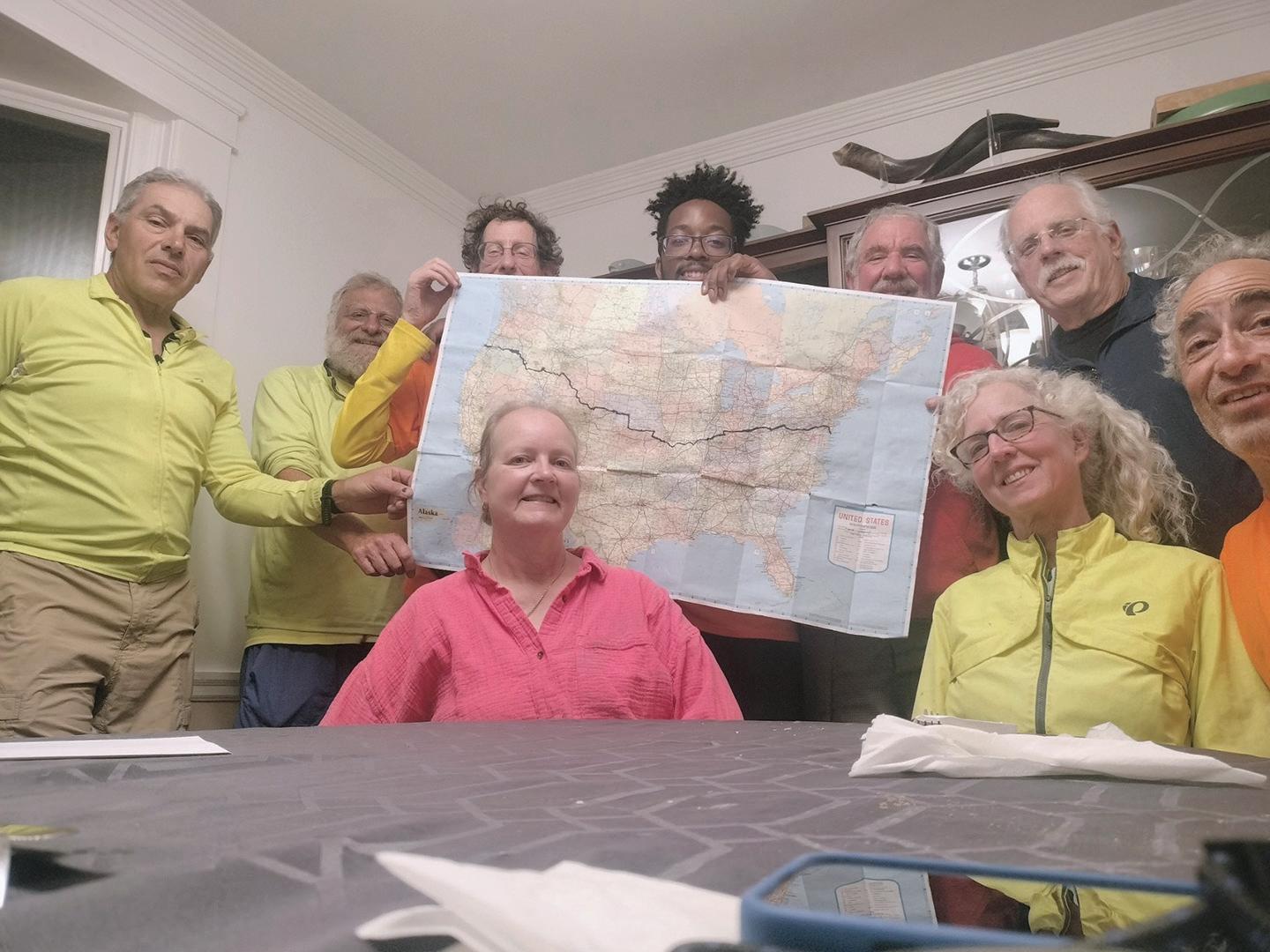
Lodgings included motels, short-term housing rentals, a bunkhouse and “an old school resort that was pretty funky,” Rubenstein said, noting that meals also ran the gamut from peanut butter sandwiches to restaurants. “Where to eat was a big deal. You can imagine, with a bunch of old, retired, professional Jews ‘googling’ restaurants for reviews.”
Cycling through tiny towns in America’s heartland was, he said, both “a blast and a learning experience.”

The group evoked curiosity among locals, especially when they saw the support van covered with stickers from all over the U.S., its rooftop rack loaded with bikes, Levine said. “We’d tell them we were raising money for a charitable organization and knew each other from the same congregation.”
“There’s enough antisemitism in America we were a little cautious, but we did not hide anything, either. Most people did not ask for details, but we’d answer those who did, and they rarely said anything more. Immigration is a big political thing right now. But no one was hostile.”
Mosse, a native of Brazil and a professor of computer science at the University of Pittsburgh, said he encountered “zero animosity” and, on the whole, people were “super welcoming.”
The trip was an inspiration, he said, with kudos for his fellow cyclists.
“It was beautiful to see the strength in these septuagenarians. I was the second-youngest person in the group and I’m the one who had to leave with an Achilles tendon problem, while the 70-plus crowd was still going strong.”
“I’m thinking when I grow up I want to be like these guys. I can’t help but smile remembering.” PJC
Deborah Weisberg is a freelance writer living in Pittsburgh.
p From left: Mark Rubenstein, Harry Levinson, Nancy Levine and Dan Mosse Photo courtesy of Mark Rubinstein
p Dor Hadash cyclists reach their cross-county final stop eruv Shavuot at the home of Rabbi Cheryl and Mark Klein in Margate, New Jersey Photo courtesy of Cheryl Klein
Headlines
These countries are harshly critical of Israel in Gaza but have its back with Iran. Why?
By Ron Kampeas | JTA
WASHINGTON – A decade ago, Israel’s government and the three major powers in Europe were diametrically opposed to Israel on how best to stop Iran from going nuclear. Britain, France and Germany all favored the Iran nuclear deal; Israel did its best to keep it from happening.
Now, with Israel and Iran verging on all-out war the European governments and Israel are — with minor tonal differences — on the same page. The leaders of all three European countries have said Israel’s right to self-defense and preventing Iran from obtaining a nuclear weapon are paramount.
The expressions of support for Israel since it launched attacks on Friday on Iran’s nuclear and weapons systems are especially remarkable because leaders of all three countries have been sharply critical of Israel for its conduct of the war with Hamas in the Gaza Strip.

Foreign policy experts attributed the comity on Iran to Europe’s alarm at the recent report by U.N. experts that Iran is closer than ever to nuclear weapons breakout. Another factor is Iran’s alliance with Russia in its war against Ukraine.
“Here’s the U.N. agency that says, for 20 years, the Iranians have been violating the terms of the [Nuclear] Nonproliferation Treaty,” Dov Zakheim, an undersecretary of defense in the George W. Bush administration, said in an interview, referring to an International Atomic Energy Agency report published just a day before Israel launched its attacks.
“These three countries are totally committed to the NPT, and so their concern is, if the Iranians are violating the NPT — whether it’s within a month, six months, six weeks, six days — the Iranians are going to forge ahead and come up with a nuclear weapon,” said Zakheim, who now comments on foreign policy for The Hill newspaper. “And it’s not just that the weapon is a threat to Israel. It’s a threat to the rest of the Middle East.”
Halie Soifer, a national security adviser to former Vice President Kamala Harris when Harris was a California senator, said the “E3,” as they are known, have for decades been at the forefront of keeping Iran from getting a nuclear weapon.
After the IAEA “revealed in the report that Iran was noncompliant, and had failed to disclose its enrichment, it was those three European countries that took the lead in introducing a resolution about it,” said Soifer, who is now the CEO of the Jewish Democratic Council of America. The resolution, she said, “calls upon Iran to urgently remedy its non-compliance.”
The IAEA report appeared to be very much front of mind for all three leaders in their comments after Israel launched what it said were preventive attacks.
French President Emmanuel Macron
French President Emmanuel Macron said in the immediate aftermath of Israel’s first strikes that Iran was principally responsible because it was accelerating its nuclear program.
said in the immediate aftermath of Israel’s first strikes that Iran was principally responsible because it was accelerating its nuclear program.
“Iran bears a very heavy responsibility for the destabilization of the region,” Reuters quoted Macron as saying on Friday. “Iran is continuing to enrich uranium without any civilian justification and to levels that are very close to what is needed for a nuclear device.”
Keir Starmer, the British prime minister, said on Saturday that he sent combat and support aircraft to the region. The decision, he said, came after what he described as a “good and constructive” conversation with Israeli Prime Minister Benjamin Netanyahu “that included discussions about the safety and security of Israel, as you would expect, between two allies.”
German Chancellor Friedrich Merz also spoke with Netanyahu. “Israel has the right to defend its existence and the security of its citizens,” he said Sunday in a social media post. “Iran’s nuclear weapons program is an existential threat to the State of Israel.”
All three leaders were in Canada for the G7 summit of leading industrial nations, and each has said they hope the umbrella group – and above all the Trump administration – commit to a united front of
supporting Israel while calling for deescalation. President Donald Trump appears to be on board.
The tone from the European leaders was markedly different from the harsh criticisms and threatened actions from the same leaders alarmed by reports that Israel is impeding the delivery of humanitarian assistance to Palestinians in Gaza. Israel denies the reports.
In recent weeks, Germany’s government announced it is considering the ban of the sale of some weapons to Israel, which would be unprecedented for the country that has traditionally been Israel’s strongest supporter in Europe. France on Monday curtained off an Israeli exhibit at a Paris arms expo, saying it had warned the Israeli manufacturers not to display “offensive” weapons. Britain suspended its free trade negotiations with Israel and sanctioned two extremist ministers.
Laura Blumenfeld, a senior fellow at the Phillip Merrill Center for Strategic Studies at Johns Hopkins University, said the three countries are committed to maintaining what they see as moral foreign policy positions because of their collective “guilt and history” as colonial powers and in Germany’s case, its Nazi past.
“From their point of view, Netanyahu’s
assault on Gaza has gone from a reasonable response to Oct. 7,” when Hamas launched the current war with massacres inside Israel, “to a mad act of collective punishment on an enfeebled population,” Blumenfeld said in a text message.
“Iran by contrast is a vast territorial omnivore, a theocracy and threshold nuclear power, that has declared its intent to destroy the small state of Israel. Israel is an ally,” she said. “The threat is existential.”
Also notable was the difference in tone from a decade ago, when the then-leaders of all three countries robustly backed the nuclear deal brokered then by the Obama administration — a deal that Netanyahu did his best to scuttle.
“We are confident that the agreement provides the foundation for resolving the conflict on Iran’s nuclear program permanently,” German Chancellor Angela Merkel, French President Francois Hollande and British Prime Minister David Cameron said in a Washington Post op-ed they coauthored at the time.
By contrast, Ron Dermer, then Netanyahu’s envoy to Washington and now one of his closest advisers, said then on the same pages that the deal “makes things much worse, increasing the chances of conventional war with Iran and its terror proxies.” In 2018, Trump at Netanyahu’s behest exited the deal, which triggered Iran’s accelerated rush to enrich weapons-grade fissile material.
The three European nations’ current backing for Israel is not inconsistent with their position a decade ago, said Ilan Goldenberg, who held senior Iran-related positions in the Obama administration state and defense departments. In both instances, he said, the Europeans are seeking the best means to keep Iran from going nuclear; the difference is, Iran is now much closer to a weapon.
“Our European allies probably feel, ‘This is not what we wanted, but now that we’re here, we’ll certainly be happier if it ends in a way where Iran’s program is set back as much as possible,’” said Goldenberg, now a senior vice president at J Street, a liberal Jewish Middle East policy group.
Another factor in Europe’s wariness of Iran is its regime’s long history — essentially from its inception in 1979 — of deploying assassins and terrorists to Germany, France and other countries to eliminate its dissidents and enemies. “We are preparing for Iran to target Israeli or Jewish targets in Germany,” Merz said in his statement.
Also at play is Iran’s alliance with and tactical assistance to Russia as its war against Ukraine drags on.
Zakheim said recent threats by acolytes of Russian President Vladimir Putin to go nuclear have deeply unsettled Europe. “All his henchmen keep talking about using nuclear weapons, which really terrifies Western Europe and the big Western European countries,” he said.
Iranian Supreme Leader Ayatollah Ali Khamenei “is Putin’s arms dealer, a reliable supplier of drones,” Blumenfeld said. “And Israel is blowing up his business.” PJC
p French President Emmanuel Macron with Israeli President Isaac Herzog in Jerusalem, Israel, Oct. 24 2023 Photo by Amos Ben Gershom / Government Press Office of Israel, via Wikimedia Commons
Headlines
Hamas attacks Gaza aid group, kills at least five, staff feared taken hostage
Hamas attacked a bus carrying about two dozen members of the Gaza Humanitarian Foundation team last week, with “at least five fatalities, multiple injuries and fear that some of our team members may have been taken hostage,” the aid group stated, according to a JNS report.
The “local Palestinians,” who were “working side-by-side with the U.S. GHF team,” were on the way to one of the U.S.-backed aid group’s distribution centers west of Khan Younis, the foundation said.
“We condemn this heinous and deliberate attack in the strongest possible terms,” it stated.
“These were aid workers. Humanitarians. Fathers, brothers, sons and friends, who were risking their lives every day to help others.”
The group, which vowed to continue its mission “to provide critical aid to the people of Gaza” despite the “heinous attack,” stated that “tonight, the world must see this for what it is: an attack on humanity.”
“We call on the international community to immediately condemn Hamas for this unprovoked attack and continued threat against our people simply trying to feed the Palestinian people,” it said.
The group, which is independent of the United Nations and tries to deliver aid to Palestinians without Hamas stealing the
supplies, has endured threats from the terror group before, it said.
“This attack did not happen in a vacuum,” it said. “For days, Hamas has openly threatened our team, our aid workers, and the civilians who receive aid from us. These threats were met with silence.”
Arizona governor vetoes bill that would let parents sue teachers over antisemitism
Arizona Gov. Katie Hobbs vetoed a bill last week that would have enabled students and parents in Arizona to sue teachers for teaching or promoting antisemitism, JTA reported.
“Unfortunately, this bill is not about antisemitism; it’s about attacking our teachers,” wrote Hobbs in a letter announcing the veto.
“It puts an unacceptable level of personal liability in place for our public school, community college, and university educators and staff, opening them up to threats of personally costly lawsuits,” Hobbs continued.
The “Antisemitism in Education Act” outlined a laundry list of provisions that would be labeled as antisemitic and therefore warrant litigation by students and parents in K-12 schools and universities. The bill adhered to the International Holocaust Remembrance Alliance definition of antisemitism, which has been criticized for labeling some anti-Israel sentiments as antisemitic.
Opponents of the bill said it violated the free speech rights of teachers, private universities and students.
Today in Israeli History
June 23, 1944 — Photographer
Alex Levac is born
June 20, 1950 — First Festival of Jewish Music opens Israel’s first Festival of Jewish Music begins in Jerusalem and runs until July 1. Most performances present classical music, including Leonard Bernstein, but two events showcase Israeli folk music.
June 21, 1990 — Diplomat Eliahu Eilat dies
Eliahu Eilat, who played a key part in winning President Harry Truman’s U.S. recognition of Israel in May 1948 and served as Israel’s first ambassador to the United States, dies in Jerusalem at 86.
June 22, 1989 — NBA player
Omri Casspi is born
Omri Casspi, the first Israeli to play in the National Basketball Association, is born in Holon. The Sacramento Kings select him 23rd in the first round of the 2009 NBA Draft, and he plays 10 seasons.

The sponsor of the bill, Republican state Rep. Michael Way, condemned Hobbs’ veto in a post on X: “I am deeply disappointed by her decision — paying lip service to opposing antisemitism while backing away from a law with real teeth.”
Rabbis say Bosnian officials torpedoed their Sarajevo meeting
A major European rabbinical group last week accused the Bosnian government of forcing the cancellation of the group’s biannual meeting in Sarajevo, possibly in connection with Israel’s actions, JNS reported.
The Swissotel in Sarajevo pulled the plug suddenly on the biannual Standing Committee meeting of the Conference of European Rabbis following political pressure from a senior Bosnian government official, according to CER President Rabbi Pinchas Goldschmidt.
Swissotel and the office of the Federal Minister of Labour and Social Policy of Bosnia and Herzegovina, Adnan Delic, did not immediately reply to a JNS query requesting a reaction to Goldschmidt’s allegation that Delic canceled the event to punish the rabbis for Israel’s actions.
The cancellation followed a statement by Delic calling the conference an attempt at “legitimizing a genocidal creation and their shameful acts of crimes against humanity,” referencing Israel. “This is directly contrary to everything Sarajevo is and has stood for throughout history,” he added, urging local and government authorities to block the gathering.
The high-profile gathering was scheduled
to take place this week, featuring participants from across Europe, including France, Germany, the Netherlands and the United Kingdom. The meetings typically address key challenges facing Jewish communities and broader issues of religious freedom.
CIA analyst, who leaked Israeli plans to strike Iran, gets 37 months in prison
The former CIA analyst Asif Rahman, who admitted in January that he leaked classified information about Israel’s military response to Iran’s missile attacks on Oct. 1, 2024, was sentenced last week to 37 months in prison, JNS reported.
The 34-year-old had faced up to 10 years in jail for the two counts — illegally retaining and transmitting classified national security information.
Rahman had been a CIA employee since 2016 and carried a top secret security clearance, including access to sensitive compartmented information, which refers to materials about intelligence sources and methods, and the analytical processes used to generate them.
The Cincinnati native and Yale University and University of Chicago graduate admitted to accessing and printing two top-secret documents on Oct. 17.
The leak forced Israel to delay a strike, according to federal prosecutors, though Israel took military action on Oct. 26 as part of a back-and-forth series of strikes. PJC
— Compiled by Toby
Tabachnick


Photojournalist Alex Levac, a 2005 Israel Prize winner, is born in Tel Aviv. His photo of a Bus 300 hijacker in custody in 1984 disproves the official story of the deaths of the four terrorists in the attack.
June 24, 1987 — Arabs stage national Equality Strike
Israeli Arabs hold an Equality Day strike to protest discrimination and demand equal per capita funding for Jewish and Arab local authorities. Despite being dismissed as “Communist incitement,” the strike wins increased funding.
June 25, 2009 — Bridge of Strings opens
Jerusalem inaugurates the 1,180-foot-long Chords Bridge, known as the Bridge of Strings, to serve pedestrians and the new light-rail system at the entrance to the city. The bridge features a 384-foot spire.
June 26, 2004 —
‘Jerusalem of Gold’ writer Naomi Shemer dies
Musician Naomi Shemer, known for “Jerusalem of Gold,” dies at 73 after a long battle with cancer. She wrote “Jerusalem of Gold” for a festival in 1967, and singer Shuli Natan made it famous. PJC


Items are provided by the Center for Israel Education (israeled.org), where you can find more details.
p Omri Casspi retired from professional basketball in
Headlines
For Israelis under Iranian barrage, deadly nights alternate with days brimming with life
By Deborah Danan | JTA
TEL AVIV — The booms from the night’s Iranian missile strike could be felt across the region, including in my home in Jaffa. In that moment, it felt — to this former Londoner’s ears — like a scene from the Blitz, when the Nazis pounded England with nightly bombs.
Then, Brits poured into Tube stations to wait out each night’s barrage together, before emerging and carrying on with their lives — in a pattern that Israelis have sought to replicate during the harrowing first days of war with Iran.
After four days of Iranian missile strikes that killed at least 24 people, wounded hundreds, and left thousands without homes, Israel has settled into a new kind of duality: fear of what lies ahead, and an effort to maintain some semblance of ordinary life. By Monday afternoon, despite the devastation, beaches were full, shops even more so, and many people returned to work, balancing between anxiety and routine.
On Sunday night, Gabriella Turner, a Jerusalem resident, had come to help her sister Aydan in central Tel Aviv care for her 2-year-old nephew JJ after Aydan fell ill with food poisoning. When the incoming sirens began, they moved into the safe room.
“Out of nowhere this massive boom, the whole place shook like the floor moved underneath us,” Turner said. “We kind of flew on to each other and for a second I really thought the building had been hit. I just froze, thinking: What if I can’t get out?”
She recalled: “My nephew JJ was so terrified. We tried to explain to him that everything was going to be okay, and it was just a boom, but we weren’t even sure that it was going to be OK.”
When they eventually looked outside, they saw that the hotel next to them had taken a direct hit — shielding their own building. Its facade destroyed, cars were ablaze and shopfronts lay in ruins.
“The scariest part is knowing that these missiles aren’t targeting soldiers or military sites, they’re targeting homes, families, a baby sleeping in his crib,” Turner said. “That’s what stays with you, that someone wanted this to happen, and that’s crazy in my eyes.”
Elsewhere in northern Tel Aviv, a missile slammed into an apartment building near the home of Kate Leaman, a market analyst originally from the United Kingdom. The blast shook her own high-rise tower. “It felt like the bomb was on my building,” she said.
Leaman said that since the first night of the Iranian strikes, she and her ex-husband had decided to split up their two children because, she said, “when they’re together it’s just chaos.”
“It’s a temporary arrangement just to get through this. Because even we adults are overstimulated, it’s just too much.”
Her daughter’s teacher was unable to hold a planned Zoom class on Monday morning after her own home was destroyed. Leaman was scheduled to join a work call, but could barely concentrate.

By Monday afternoon, despite the devastation, beaches were full, shops even more so, and many people returned to work, balancing between anxiety and routine.
“I usually write the financial news and I’ve never missed a day, not during Hamas [rockets], not during COVID. But I did today,” she said. “But my Israeli colleagues were acting like everything’s normal. Israelis are cut from a different cloth from us, aren’t they?”
By the afternoon, beaches along the Tel Aviv coast were packed with volleyball and football games, but most of the players were young people, with few children or families in sight.
A day earlier in nearby Bat Yam, where a missile had slammed into a residential building the previous night, killing nine people including three children, the high street was open and busy. Shops with shattered windows from the shockwaves continued to serve customers. A shoe store owner shrugged: “Why should I stay at home? What will I do there?”
At the Bat Yam strike site, where Prime Minister Benjamin Netanyahu had just toured, police maintained a cordon while soldiers were handed energy drinks. A Chabad outreach truck known as a “mitzvah tank” played music nearby, while another van belonging to the Na Nach Nachman subsect of the Breslover Hasidic movement – a group known for dancing atop their vehicles – stood idle and silent. Its driver, who arrived in Bat Yam from his home in the Golan Heights, said he had hoped to lift spirits with music but changed his mind after arriving.
“It didn’t feel quite right,” he said. “But when it is, I’ll fire the music up. Everyone has their part to play. One brings food, another first aid, another joy.”
The scenes of destruction also reignited debates over Israel’s shelter infrastructure on Monday. State Comptroller Matanyahu
Englman, visiting the Bat Yam site, noted that roughly a quarter of Israel’s population lacks access to proper bomb shelters. In local WhatsApp groups, Israelis argued over whether public bomb shelters or private safe rooms offered better protection. One poster insisted underground shelters were safer, while another pointed out that many public shelters are decades old, poorly maintained and not designed for modern threats. Others emphasized that while private safe rooms are built to absorb shockwaves and shrapnel, they have never been tested against the kind of heavy ballistic missiles fired by Iran.
“Better to be in a mamad than risk being buried under rubble,” one person wrote, referring to the newer in-home safe rooms.
The debates extended to the practicalities of sheltering: Some reported that their public shelters were stifling hot after vandals stole air-conditioning units while others complained that neighbors refused to shut the heavy door, despite repeated warnings that included, in one case, a visual aid using a plastic bottle to demonstrate the relative ease of crushing it with and without its cap.
Yana, who lives near the site of the Bat Yam strike, said she usually stayed in the stairwell during Hamas and Houthi attacks rather than going outside to public shelters.
“I feel bad leaving my cats alone. But this time I felt I had to go. These aren’t launches from Gaza,” she said.
Nearby, Rom, a teenager with a large tattoo on his shin, said he had come “to check out the pretty cops.” Like Yana, he had no shelter in his home. “But I’m not moving. I sit on my couch and wait for those Iranian bastards,” he said. “If it’s my time, it’s my time. God will protect me.”
Around 4 p.m., as early warning signals began to sound again, people quickened their pace but showed little panic. This reporter searched for shelter, checking a health clinic and a bank without success. When the sirens blared, the mood shifted, and people scrambled through the streets. An Orthodox man standing on the sidewalk pointed to stairs leading down to a synagogue.
No one else was there at first. I sat down next to the ark, vaguely recalling the many social media posts of Torah scrolls that had miraculously survived past attacks intact and figuring it could be my best chance of survival. But then the Orthodox man returned and gestured for me to move, pointing to the ceiling panels above blown out by shockwaves from the previous night’s strike. I moved to sit next to a woman in a tank top reading from a book of Psalms. “There’s no service in here, what else are we going to do?” she said.
Another woman, Jenny, originally from Congo and living in Israel for 16 years, apparently did have service, and was showing others her Red Alert app, filled with red pins indicating where sirens had been activated.
She had been on her way to visit relatives hospitalized from the Bat Yam strike — her sister, brother-in-law, and brother — when the sirens sounded again. Her 8-month-old nephew, physically unscathed, had become unresponsive overnight. “Yesterday he was laughing, smiling, eating. Today he’s doing none of those things,” Jenny said.
“I have high blood pressure which was starting to relax after nearly two years of Hamas but now it’s skyrocketing,” she said. “I know God is always working extra hard in this country, but still, I’m very, very scared.” PJC
p Patrons of a cafe whose windows were shattered by a nearby missile impact sit next to piles of broken glass, Tel Aviv, June 16, 2025.
Photo by Niv Elis
Headlines
Continued from page 1
Pennsylvania Sen. Dave McCormick also issued statements supporting Israel’s preemptive strikes on Iran, saying both he and his wife, Dina, were praying for the success of Israel’s mission, “to thwart the world’s largest state sponsor of terror and its pursuit of nuclear weapons.”
Iran, he said, has been a destabilizing threat to security in the Middle East, Persian Gulf and around the world and “has the blood of Americans on its hands.”
“Preventing Iran from having a nuclear bomb is in the interest of the civilized world.
I am grateful to President Trump and his team for trying to achieve this peacefully. But just this week the International Atomic Energy Agency voted overwhelmingly that Iran was not in compliance with its obligations. So Israel has decided to act and I stand with Israel,” McCormick said.
U.S. Rep. Guy Reschenthaler, the Republican representative of Pennsylvania’s 14th district — which includes all of Fayette, Green and Washington counties and most of Indiana, Westmoreland and Somerset coun-
U.S. Rep. Summer Lee, who represents Pennsylvania’s 12th district, which includes Squirrel Hill, has been a vocal critic of Israel even before the Jewish state was attacked by Hamas on Oct. 7, 2023. She has supported several pieces of legislation intended to diminish U.S. support of Israel, including bills to end the provision of defensive military systems.
On X, Lee wrote: “Israel has once again bombed Iran, a dangerous & reckless escalation.”
brought this action upon themselves and their people,” Forgie said. “That region, and the world for that matter, cannot afford a nuclear armed Iran who supports terrorist regimes.”
In a Facebook post immediately following news of the operation, Julie Paris, StandWithUs Mid-Atlantic regional director, called Israel a “nation of heroes.”
“The IDF’s daring and heroic operation against the Iranian regime and its nuclear capabilities continues, but one thing is clear: we are living through history, and
“Preventing Iran from having a nuclear bomb is in the interest of the civilized world.”
–SEN. DAVE MCCORMICK
“The war criminal Netanyahu wants to ignite an endless regional war & drag the US into it,” Lee’s post read. “Any politician who tries to help him betrays us all. The American people do not want this.”
Adam Forgie, the Democratic mayor of

JCBA traces its roots to 1992 when its precursor, the Hebrew Burial Association of Pittsburgh (originally called Chesed Shel Emeth, and incorporated on June 4, 1910) merged with the United Jewish Federation Cemetery Association. Before the unification, HBA had spent decades managing cemeteries belonging to closed congregations and benevolent organizations. With the start of JCBA, that work expanded. During the next 30 years, JCBA took ownership of several cemeteries and continued caring for other local burial sites.
The organization currently maintains, owns and supervises 45 cemeteries, according to JCBA tax filings.
For the organization, beautifying grounds is one task. Keeping history alive is another, Schwimer said. Along with operating routine volunteer cleanups, which “we’ve done quite successfully,” JCBA plans on making cemetery outings more educational.
Pittsburghers.
Discussing the possibilities ahead, Schwimer described a potential program that could continue cemetery maintenance while conveying the work’s importance to a new generation: “twinning.”
By pairing volunteer youth with family sections in local cemeteries, participating students, Schwimer said, can “learn the history of our families, take care of those sections, say prayers during High Holidays and even place flags by veterans’ graves during Memorial Day.”
Death doesn’t have to define every aspect of Jewish burial, she explained.
“Long before kids have to come to a cemetery for very emotional reasons, there can be interesting reasons — teachable moments — and very beautiful reasons to be at a cemetery,” she said.
These initiatives are supported by grants
I have no doubt that one day, history books will teach how on this day, Israel made the world safer with its incredible intelligence capabilities, cutting-edge military strength, and determination to survive. Gd willing, the Iranian people will soon be free from the clutches of nearly 50 years of oppression and violence,” Paris wrote.
prayed for “their immediate safety, strength and well-being and for the protection of future generations to come as Israel defends itself from Iran’s nuclear and ballistic missile programs and other threats posed by the Iranian regime.”
Jeff Finkelstein, Federation’s president and CEO, said that the organization was working to ensure there were no local threats in response to the operation and that “our security apparatus is not only functioning, but people know what to do,” he said. Federation, Finkelstein noted, had already been in touch with all the local Jewish organizations and congregations and had reached out to “families of any of the young people on Federation-sponsored programs right now in Israel to make sure everyone is OK.”
Those now in Israel, he said, include individuals on a national LGBTQ+ mission, as well as those on Birthright trips.
And while Finkelstein said there may be some uncertainty about the full details of Israel’s mission and Iran’s response, one thing, he said, is sure:
“I believe any country has a right to defend itself and her citizens. That is what Israel appears to have done with their incredibly sophisticated attack on Iran’s nuclear facili-

from the Jewish Federation of Greater Pittsburgh and the Federation's SteelTree Fund.
Days before officially joining JCBA on June 16, Rachel Bassin, the organization’s newest hire, said she understands why peers and younger Jews have historically lacked interest in burial work.
“It can seem overwhelming and scary, so taking away stigma and fear is important,” Bassin, 22, said.
Before becoming JCBA’s operations coordinator, Bassin worked for the Jewish Cemetery Association of Massachusetts.
She mentioned cemeteries in New England that had been abandoned and said, “I don’t want that happening to anyone’s loved ones. The work has to get done and people have to know their loved ones are being taken care of after they die.”
Bassin, a recent graduate of Denison University, said she’s eager to come to Pittsburgh and promote JCBA’s work especially as it relates to teaming up with a younger demographic.
“Cemeteries are a necessary aspect of human
life,” she said. “People die. It’s a sad part of life, but a true thing, and it’s important not to overlook what happens after. It’s important to take care of people’s family members.”
In working with teens, Selig said she stresses the value of looking beyond the present and considering life “outside your world.” It isn’t necessarily easy for people to imagine “what comes next,” but the process produces “core Jewish values,” she continued. “You pass something on to them. You leave a legacy so when you move on, they know how to keep that legacy alive.”
That’s what JCBA is trying to do: Demonstrate the work’s weight so the next generation can continue the endeavor, Schwimer said. “Whether they are our family or someone else’s, these cemeteries need to be taken care of financially, physically, spiritually and ritually. And if we don’t do it, who will?”
PJC
Adam Reinherz can be reached at areinherz@pittsburghjewishchronicle.org.
David Rullo can be reached at drullo@
p College students join a cemetery cleanup organized by JCBA. Photo courtesy of JCBA p Beth Abraham Cemetery in Pittsburgh
Photo courtesy of JCBA
Opinion
We came to defend
American democracy
— not to be blindsided by hate
Guest Columnists
Meryl Ainsman and Sue Berman Kress


As proud activists, we attended the No Kings rally at the City County Building downtown this past Saturday. Decked with clever signs, we arrived early and were invigorated by the size and the enthusiasm of the crowd that was gathering. There was an aura of camaraderie and community. Throngs of people were gathered to protest what we worry is the increasing diminishment of democracy under the current administration. Selfies were taken and videos filmed. We were proud and pleased to be there and stand with thousands of other Pittsburghers and millions of Americans in cities around the country.
Knowing that the protest could include progressives whose focus is addressing issues
involving the current Israeli-Palestinian conflict, we were aware but not surprised to see some “Free Palestine” flags in the crowd and some people wearing keffiyehs. We’re strong proponents of free speech, so we saw that as unfortunate but acceptable. The speakers
proceeded to spout vitriol against Israel and against the Jewish community. He told this crowd of thousands that his Jewish community taught him “since [he] was 12 ... that Palestinian people needed to die for Jews to feel safe.” He claimed that American soldiers were training
As the chants of “Free Palestine” swelled and fists were pumped into the air, we felt so uncomfortable and betrayed that we turned and left before he had even handed back the microphone.
began — one discussing the threat to our legal principles, another focused on the threat to our scientific institutions (especially central here in Pittsburgh), etc. The crowd was energized and unified.
But then Jacob Blumenstein was introduced, representing Jewish Voices for Peace. Though his appearance was not on any published agenda, he was clearly invited to speak by the rally organizers. He introduced himself as a fourth-generation Pittsburgh Jew, and then
with the IDF in Israel “to bring their tactics of oppression and weapons of surveillance here to use against us.” He did not once mention the current threats to American democratic principles, the authoritarian behavior of the Trump administration, or any other domestic policy issue that this rally was designed to address. Again, as advocates for free speech we understand that he was entitled to his opinion. We simply cannot fathom why his remarks were included in a rally whose sole focus was on
Between missiles and messages
Guest Columnist
Yaron Buskila

The recent events leave no room for doubt: Israel has taken responsibility not only for its own fate but for that of the free world, launching a military campaign against the head of the global terror snake — Iran.
In a rational world, such a move would have been led by an international coalition. But Israel, having learned the bloody lessons of Oct. 7, 2023, chose not to wait. While certain nations continue, true to the best of European tradition, to avert their eyes from threats near and far, and calmly sip their morning cappuccino, Israel acts. And, thanks to its initiative, the world sleeps more securely at night.
The confrontation with Iran marks a strategic turning point. It’s not merely an exchange of fire, but a battle over the future regional order. Israel has inflicted significant damage on Iran’s nuclear program, striking
infrastructure, eliminating key scientists and disrupting critical systems. Though the full scope is yet to be assessed, it’s already clear that Iran’s genocidal ambitions have been meaningfully delayed.
Just 24 hours into the campaign, Iran’s weakness was laid bare. Unable to respond
now forced to improvise.
Domestically, the regime in Tehran is crumbling. Public anger among its civilians, especially women and the younger generation, is growing. A regime change that once seemed like a fantasy is now closer and more plausible than ever.
As a senior IDF general once told me, “Every crisis is a foundation for excellent relationships — in private life and in diplomacy.”
directly to Israel’s aerial superiority, it was left exposed and scrambling. The only “superiority” it maintains is rhetorical. The chokehold Iran constructed over decades is unraveling; Hezbollah is bleeding and under internal pressure in Lebanon, the Syrian front is held firmly by the Israel Defense Forces and the Houthis are steadily losing ground. Iran is
Meanwhile, global powers tread carefully. China and Russia have no interest in a regional war that would destabilize global energy markets, but neither will they abandon Iran entirely. Tactical support from them may continue, though without direct military involvement. By contrast, the United States, under President Donald Trump, maintains a
lifting up American democracy. It was honestly a gut-punch to listen as he hijacked the purpose of the rally and divided this previously unified rally crowd. As the chants of “Free Palestine” swelled and fists were pumped into the air, we felt so uncomfortable and betrayed that we turned and left before he had even handed back the microphone. On our way out we encountered many others, Jewish and non-Jewish, who felt the same and were all headed away from the rally. One woman was so angry that she was visible shaking.
We accept this speaker’s right to feel and to espouse what he and his organization believe. But we absolutely resent being deceived into attending this rally, whose national stated purpose was a singular focus on the threat to America’s democracy, and having that unity and positive energy be fractured by his hateful and divisive speech. PJC
Meryl Ainsman is a longtime leader in the Pittsburgh and national Jewish communities. Sue Berman is a retired clinical psychologist and now works full-time as a volunteer with Jewish and other community nonprofit organizations.
firm stance, supporting Israel militarily and diplomatically without yet leading a fullscale offensive.
As a senior IDF general once told me, “Every crisis is a foundation for excellent relationships — in private life and in diplomacy.” And indeed, despite the chaos, the Abraham Accords have not disappeared; perhaps they are even gaining strength. Moderate Arab states increasingly recognize the Iranian threat, and Israel’s decisive action may pave the way for historic agreements that could finally realize former Israeli Prime Minister Shimon Peres’ vision of a new Middle East.
The global media is captivated by Israel’s capabilities, even if that admiration won’t translate into planeloads of flowers as thanks for confronting one of the greatest global threats in recent decades.
Still, Israel will continue fighting for its future and the future of the entire region. PJC
Lt. Col. (res) Yaron Buskila is the CEO of the Israel Defense and Security Forum. This article first appeared on JNS.
Guest Columnist
Rachel Sharansky Danziger

We were 10 minutes away from landing in Tel Aviv when a surprising announcement upended all our expectations.
“Due to a security situation, we were ordered to reroute this airplane to Cyprus. Please understand that we don’t know anything else at this point. Please be patient, and we will let you know once we find out more.”
Short sentences. Honestly? Terrifying sentences. Yet what they achieved was remarkable.
Within less than a minute, they gathered all of us — Israelis and non-Israelis, religious
and secular, Jews and Arab — and turned us into one big family. For the next several hours of confusion, everyone on the plane was looking out for everyone else.
The crew set out toys for the kids in the back of the airplane, transforming that none-too-inviting space into an impromptu play area. Passengers loaned phones to one another. A young American woman opened a hot spot for half the plane, generously burning through her mobile data for the rest
of us. I found myself in the unlikely position of guiding other passengers through the best way to purchase a local sim (if you knew me personally, you would appreciate the absurdity. The credit goes to my wonderful husband, who, after taking the kids to and from the bomb shelter in my absence, threw himself into helping me manage the situation from afar well before I even realized I
Please see Danziger, page 13
Opinion
Chronicle poll results: Blocking people on social media
Last week, the Chronicle asked its readers in an online poll the following question: “Have you blocked someone on social media because you disagree about the Hamas/Israel war?” Of the 207 people who responded, 35% said yes; 54% said no; and 11% said they weren’t on social media. Comments were submitted by 41 people. A few follow.
Why block them when you can simply ghost them instead?
Not that I haven’t really wanted to do so, but I practice and preach that “one can only make peace with an enemy” — so I keep the dialogue going in the longshot hope that something I post may finally resonate with the antisemite/ignoramus and reduce their blind hatred/cluelessness.
I have not blocked anyone based on this or any other issue. If a person is a friend or colleague and thus we are connected on social media, it seems that would be a good place to begin fostering mutual understanding.
Danziger:
Continued from page 12
would need means of communication).
People offered food and hugs and words of encouragement to whoever needed them. Some passengers took it upon themselves to help the flight attendant so she could catch her breath for a moment. Whoever got their phones to work performed the profound kindness of sharing the news from Israel with everyone else.
This outpouring of mutual support didn’t end once the captain informed us that we should disembark, find accommodations, and wait for future developments. Strangers helped each other search for places to stay, buy the right adapters and carry heavy bags. A group of young Israeli men helped me get on the bus toward city center, jovially acknowledging that they weren’t sure where
Have you blocked someone on social media because you disagree about the Hamas/Israel war?
Blocks are for abusive behavior, not opinions. I’d block someone I agree with if the person is being a jerk. Respectful discourse about disagreements is good for society; we need to get out of our bubbles.
People don’t understand that Hamas started the war. It’s hard for me to be friendly with someone who can’t understand that point of view.
I block every Zionist I encounter online.
I post “Stand with Israel” material and my photo has “Stand with Israel.” I have not blocked anyone nor have I been blocked. But if someone is a Hamas supporter and posts that on a response or their post, I will drop them as a contact.
First, I unfriended a few people. Then I just deactivated my entire account.
I want to see what the other side has to say, no matter how misinformed they may be.
I miss my family, and I desperately want to be with them, to be home. But here in Cyprus, surrounded by people who used to be strangers, none of us is an island.
it went, but “don’t worry, we will figure it all out together!”
Another Israeli noticed me walking alone in the street later and went out of his way to make sure I was safe. The Starbucks where I’m currently writing is filled with Israelis speaking about the situation in Hebrew and Arabic, offering each other commiseration and advice.
Fetterman serves all Pennsylvanians, not just Democrats
I respectfully disagree with most of the points raised in Naomi Weisberg Siegal’s letter to the editor published in the Chronicle’s June 6, 2025, edition (“Fetterman should do the job for which he was elected — or step aside”).
To address one: Ms. Siegel somehow believes that because Sen. Fetterman is a Democrat he should unthinkingly cleave to his party’s platform on all matters, apparently most especially when it comes to anything that aligns “him with the Trump coalition.” Sen. Fetterman won the election with just over 51% of the vote; I am happy he did. He understands, however, that his duty is to all Pennsylvanians, and that he must exercise his judgment accordingly. Does Ms. Siegel think that Sen. Fetterman should ignore all views that deviate from his party’s position and simply follow predetermined written directives? I hope not. A legislator should, with due regard to his or her party’s positions (and not a slavish adherence to strict party dogma, whether Democratic or Republican), be guided by what he or she believes is in the best interests of those who live in his or her state (and depending on the issue, our country), have an open mind, weigh the issues, and engage in thoughtful negotiation and compromise. Sen. Fetterman does.
This outpouring of kindness was not limited to the “stranded” population either. Since we left the plane, I have been inundated with invitations, offers of assistance and kind words from local Jews — from the Chabad rabbi and rebbitzen to friends of friends, to total strangers.
I have no idea how long I will be on this island.
I’ve learned some uncomfortable truths about any number of (former) friends on the so-called progressive left.
Rather than blocking someone, I’ve valued the opportunity to reach out to people mindlessly supporting virtually everything Israel does in Gaza and also the West Bank in an attempt to get them to consider the immorality of the actions and the effect it will have on peoples’ view of Israel and of Jews in general. These atrocities have to stop — they endanger us all.
Absolutely, and it’s not so much because of their views on the war — it’s the lies and conspiracies they were repeating that caused me to say, “Enough is enough; I don’t want to see this crap.” PJC
— Compiled by Toby Tabachnick
Chronicle weekly poll question: Do you support Israel’s military operation in Iran? Go to pittsburghjewishchronicle. org to respond. PJC
I miss my family, and I desperately want to be with them, to be home.
But here in Cyprus, surrounded by people who used to be strangers, none of us is an island.
I am surrounded by my people, and they are family too.
We are in it together, wherever we are. May we all be safe, and strong, and successful.
Am Israel Chai PJC
Rachel Sharansky Danziger is a Jerusalemborn writer and educator. She writes about Judaism, history and life in Israel for the Times of Israel and other online venues, and explores storytelling in the Hebrew Bible as a teacher in Matan, Maayan, Torah in Motion and Pardes. This article first appeared on The Times of Israel.
There is at least one matter on which Ms. Siegel and I do agree: Sen. Fetterman should dress in a manner more appropriate for a United States senator.
We invite you to submit letters for publication. Letters must include name, address and daytime phone number; addresses and phone numbers will not be published. Letters may not exceed 500 words and may be edited for length and clarity; they cannot be returned. Send letters to: letters@pittsburghjewishchronicle.org or Pittsburgh Jewish Chronicle, 5915 Beacon St., 5th Floor, Pittsburgh, PA 15217
We regret that owing to the volume of correspondence, we cannot reply to every letter.
Jonathan Schmerling Mt. Lebanon
Life & Culture
‘Egg roll’ lettuce wraps
Ingredients
Serves 3-4
1 ½ pounds ground beef
By Jessica Grann | Special to the Chronicle
Iwas getting bored with my regular dinner rotation and this recipe brought my taste buds back to life.
I’m a novice when it comes to any sort of Asian cooking but I know when I like the flavors. And when you live in a place without kosher versions of your favorite foods you have to experiment and learn to make them yourself.
I love these lettuce wraps, which are chock-full of ground beef, cabbage and yummy fresh ginger. I use a lot of seasoning in the filling to offset the crispy, watery lettuce. If you love egg rolls then this is for you; it has all of the flavor but is healthier than a traditional egg roll.
This recipe for lettuce wraps is low carb, but one pan of the meat mixture can provide additional meal options for different palates. My husband takes the leftovers for lunch. He stuffs a flour burrito tortilla with the meat and fresh lettuce. I didn’t believe him initially when he said that it tasted great — I didn’t see how a Mexican burrito and my kosher egg roll filling would meld together, but they absolutely do.
This dish takes 20 minutes to make, including prep time and cooking, so it’s perfect for an evening when you’re low on energy but want something tasty and fresh.
2-3 tablespoons toasted sesame oil
2 tablespoons minced garlic
2 tablespoons grated fresh ginger
1 bag coleslaw plus 1 grated carrot, or 6 cups grated cabbage plus 2 grated carrots
4 tablespoons low-sodium soy sauce
4 tablespoons rice vinegar
1 teaspoon red pepper flakes, more to taste
6 scallions, thinly sliced
Sea salt to taste (taste after adding soy sauce)
1 head iceberg lettuce
Optional: toasted sesame seeds to garnish
Brown the meat over medium-low heat in a wide sauté pan. Don’t add any oil to the pot — just get it very hot and add the meat. Break the meat apart and mince it well, stirring and breaking it down every few minutes.
While the meat is cooking, mince the garlic and grate the ginger.
When the meat is fully cooked, turn off the heat and drain as much fat as you can from the pan and discard it. While the fat is where the flavor is, for this recipe you don’t want it because it will run out of your wraps and make a huge mess.
Turn the heat back to medium and make a well in the center of the meat.
Add the sesame oil and place the minced garlic and fresh grated ginger into the oil. Allow it to cook for about a minute before stirring the mixture into the meat.



Chop the cabbage and/or carrots and add it to the pot.
Stir every few minutes until the cabbage starts to soften.
After about 5 minutes add the soy sauce, red pepper flakes and rice vinegar. Stir well and reduce the heat to simmer for a few minutes.
Remove from heat.
If you’re making this ahead of time don’t cover the hot mixture because the cabbage will cook down and you’ll lose
the fresh crunch.
To roll the mixture into iceberg lettuce wraps, start at the flimsy side so that the hardest part of the lettuce leaf is on the outside edge.
Serve over rice, or try my husband’s method and roll the mixture and the lettuce in a large flour tortilla or wrap.
Enjoy and bless your hands! PJC
Jessica Grann is a home chef living in Pittsburgh.








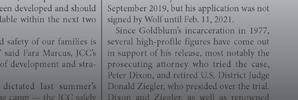



p “Egg roll” lettuce wraps
Photo by Jessica Grann
Life & Culture
Rodef Shalom exhibit illustrates floral treasures in Shadyside
By Adam Reinherz | Senior Staff Writer
Adeep-rooted garden is flowering again. For two months this summer, Rodef Shalom Congregation is inviting the public to view “A Rabbi in Bloom,” an exhibit featuring drawings inspired by the congregation’s Biblical Botanical Garden and honoring those who planted its seeds.
The opening reception, which was scheduled to be held at the Shadyside congregation on June 18, would enable attendees to see newly drawn pictures, learn more about the garden and chat with members of 3 Rivers Botanical and Nature Artists.
Holly Dobkin, a lifelong Rodef Shalom member and co-founder of 3Rivers BANA, said the reception would be a chance to see a “variety of work from some amazing artists.”
Established in January 2024 by a group of independent artists, 3Rivers BANA promotes art “representing all forms of nature,” including plant life, animal life and sea life.
The show isn’t 3Rivers BANA and Rodef Shalom’s first pairing. They previously collaborated on a project focusing on the garden’s healing plants, according to Dobkin.
Teaming up with Rodef Shalom again allows artists and community members to appreciate a local treasure, she added.
Rodef Shalom’s Biblical Botanical Garden was established in 1986 by Irene Jacob and her husband, Rabbi Walter Jacob. The late couple, who oversaw the garden for more than a quarter century, integrated Near East flora in an effort to teach visitors about biblical horticulture.
More than 100 “temperate and tropical plants grown in ancient Israel,” as well as a waterfall, desert, stream and representation of the Jordan River, are featured in the garden, according to Rodef Shalom representatives. And, more than a mere respite from the nearby sounds of Fifth Avenue,

p Image by Lisa Rasmussen
the grounds are an educational site. Plants, including wheat, barley, millet, herbs, olives, dates, pomegranates and figs, as well as cedar trees, are labeled with corresponding biblical verses.
Mayda Roth, Rodef Shalom’s director of development, called a garden a “living demonstration of the Bible.”
“Irene and Dr. Jacob made this garden happen,” she continued. “Their hard work and dedication is a legacy for future generations.”
“A Rabbi in Bloom” seeks to honor past efforts.
Whether its the exhibit or the garden itself, visitors can make use of numerous on-site educational opportunities, Roth said.
“Everyone should be a lifelong learner. That’s what the Rodef Shalom Congregation Jewish Museum attempts to do — add beauty and knowledge.”
Dobkin recalled visiting the gardens
with fellow creatives, and said the exhibit and grounds will function similarly for visitors as it’s done for illustrators: “It’s really opened eyes.”
“A Rabbi in Bloom” runs until Aug. 18. PJC Adam Reinherz can be reached at areinherz@pittsburghjewishchronicle.org.



We at the Pittsburgh Jewish Chronicle are working hard to continue to make our publication even more relevant to your needs, and your feedback is important to us. Could you please spare a few minutes to take a brief survey? It shou Id take no more than

5-8 minutes to complete. Your input will help us ensure that during these challenging times the Chronicle continues to serve you and our community in meaningful ways. In appreciation of your help, you will be eligible to enter a drawing for a $100 Giant Eagle gift card.
Visit https://survey.zohopublic.com/zs/jQD9gb to let us know what you think. Or scan this QR code:

Photo courtesy of Rodef Shalom Congregation
Life & Culture
Pittsburgh Transit has a new pickle-themed ‘rider etiquette’ campaign. Is it Jewish?
By Hannah Feuer | Forward
Don’t relish your morning commute?
Pittsburgh Regional Transit hopes to make bus and subway rides a little less sour, with a new pickle-themed campaign reminding riders to steer clear of jarring behavior.
“Keep it kosher,” one sign reads, “Littering. Salty language. Messy food. That stuff spoils the ride for everyone.”
The text is accompanied by an image of anthropomorphic pickle and hot dog passengers. The misbehaving, mean-looking pickle eats a messy hotdog while standing next to a human-size hot dog passenger who looks understandably glum.
Anyone worth their salt knows Jews and pickles go way back. In the ghettos of Eastern Europe, pickling was a practical way for Jewish communities to preserve food through harsh winters. And Jewish immigrants in New York’s Lower East Side in the late 1800s and early 1900s popularized the now iconic kosher dill.
So the campaign’s “kosher” nod and use of a classic Jewish deli staple invite the question: Is Pittsburgh Regional Transit intentionally channeling Yiddishkeit?
Adam Brandolph, a spokesperson for Pittsburgh Regional Transit — who is Jewish and whose favorite pickle is “anything spicy” — said the transit authority hadn’t looked at the campaign through a Jewish lens, at least not until the Forward called. He emphasized the secular nature of the campaign.
“‘Kosher’ is at this point so mainstream that we felt that was fine,” he said.
The project began last March, when Pittsburgh Regional Transit polled passengers

about the peskiest behaviors they had witnessed on public transit. Among more than 1,000 respondents, top complaints included littering, use of foul language, not using headphones while listening to music or taking a call, smoking or vaping, and refusing to give up seats for passengers in need.
The resulting rider etiquette campaign includes messages such as “Loud noises can be jarring,” accompanied by a pickle carrying a boombox; “They’d relish the seat,” along with a
pickle reclining across two subway seats as an elderly pickle slice holding a cane stands by; and “Want a smoke? Just dill with it,” accompanied by a brazen pickle smoking a cigarette next to distressed, humanoid french fries.
Brandolph said the transit authority timed the pickle-themed campaign around the 10th anniversary of Picklesburgh, the city’s annual festival for all-things pickled.
Pittsburgh and pickles have a storied past.
H. J. Heinz Company may be best known for
Savoring stories: Aunt Sophie’s mandel bread
By Howard Meyerowitz | Special to the Chronicle
Iinherited this recipe from my wife’s Aunt Sophie Schur. Sophie learned this recipe from her mother and she carried it with her from her family’s boarding house in Spring Valley, New York, to Chicago to San Diego and finally to Bloomfield, Connecticut. I have baked hundreds of pieces for family, friends and for numerous luncheons at Temple Beth El in West Hartford, Connecticut. It will now be a recipe I look forward to making often with my grandchildren since moving to Pittsburgh, my new home since January 2024.
Aunt Sophie’s recipe called for vanilla flavoring, but my family prefers almond flavoring. I use dried cranberries, but you could use chopped candied cherries just as well and even throw in a handful of semisweet chocolate bits.
The recipe doesn’t require a lot of prep and can be made in one bowl, and you can create whatever kind of glaze you want. I prefer a glaze made with powdered sugar mixed with

milk or oat milk. The mandel bread can also be made dairy or pareve and even gluten-free using gluten-free flour.
The cookies keep well for a couple of weeks in an airtight container and freeze well for at least a couple of months.
For a friend of mine who couldn’t consume flavorings, I used the grated rind and juice of one lemon as a substitute.
Aunt Sophie’s mandel bread
1 stick softened butter or margarine
3/4 cup granulated sugar
2 eggs
1 heaping teaspoon almond flavoring
2 cups flour
1/2 teaspoon baking powder
dash baking soda
3/4 cup slivered almonds
3/4 cup dried cranberries
Cream butter or margarine and sugar together well and beat in eggs, then add almond flavoring.
Add in flour, baking powder and baking soda and blend well.
Stir in cranberries and almonds and blend them into the dough mixture.
Wrap dough in plastic wrap and refrigerate it for at least 1 hour.
Cover a 10-inch-by-14-inch baking pan with foil and spray with a vegetable spray.
By handfuls, shape the dough into logs, 1 inch in diameter, and roll them on a plate spread with granulated sugar, then link the pieces together to form 2 14-inch long logs.
Place each log against the side of the baking sheet because the dough tends to spread as it bakes. If I have extra dough I make a
its ketchup, but it also helped put Pennsylvania pickles on the map. Today, that tradition is carried on by the Pittsburgh Pickle Company, which has a patented method of cutting their pickles: flat on the bottom, crinkly on the top.
While the Jewish connection may not have been intentional, it’s not far-fetched, according to Eric Lidji, director of the Rauh Jewish Archives at the Heinz History Center.
In the early 20th century, pickle barrels were a familiar sight along the main retail street of Pittsburgh’s Hill District, then a thriving Jewish neighborhood. And waiters at Pittsburgh’s Jewish delis doled out pickles as an amuse-bouche
“We’re no different than any other old Ashkenazi Jewish community where pickles were a major part of the cuisine,” Lidji said.
Jewish or not, pickles, it turns out, are the perfect passengers. The transit authority opted for a cartoon character, Brandolph said, because turning a real person into the face of public transit rule-breaking felt a bit harsh. But a pickle? That’s fair game — and oddly relatable.
“We also found that if it’s a little bit more playful, people would say, ‘Yeah, I get it. OK, I’m not going to do it’,” Brandolph said, “As opposed to being told, like much more directly, ‘No smoking.’ People tend not to listen.”
But the indirect messaging may have an unintended implication. If one must “keep it kosher” on Pittsburgh public transit, can passengers eat messy hot dogs on the light rail so long as the franks are all-beef Hebrew Nationals?
Alas, according to Brandolph, eating is not permitted on any Pittsburgh Regional Transit vehicles. PJC
This story was originally published on the Forward. To get the Forward’s free email newsletters delivered to your inbox, go to forward.com/newsletter-signup.
shorter log and place that down the middle of the baking sheet.
Bake in a preheated 325 F oven until the cookie becomes a rich golden brown. Remove the pan from the oven and place it on a wire rack for about 45 minutes, but no longer, because the cookie will become too hard to cut.
On a diagonal, cut the logs into pieces about ¾-inch wide.
I make a glaze using a cup of powdered sugar, a couple of teaspoons of milk and a drop of almond flavoring and drizzle it decoratively over the cookies. The glaze can be colored to make it suitable for different holidays. A chocolate glaze also works well.
Each recipe yields at least 30 pieces. PJC
Do you have a tried-and-true dish that comes with an interesting origin story? If so, we want to hear from you! Submit recipes along with their backstories to newsdesk@ pittsburghjewishchronicle.org, and write “Recipe” in the subject line. Please include a photo of the dish. You may see your submission as part of our column “Savoring Stories”!
p A poster from Pittsburgh Regional Transit’s rider etiquette campaign, instructing passengers to “Keep it Kosher” Courtesy of Pittsburgh Regional Transit
p Aunt Sophie’s mandel bread Photo courtesy of Howard Meyerowitz
Life & Culture
By Matt Lebovic | The Times of Israel
“10 Things Every Jew Should Know Before They Go to College: An Illustrated Guide” by
Emily Schrader and Blake Flayton with Kimberly Brooks (illustrator)
Targeting college-bound Jewish students and their parents, two American immigrants to Israel penned a “For Dummies”-style primer on being a Jewish collegiate during times of surging antisemitism.
The authors of “10 Things Every Jew Should Know Before They Go to College” — Emily Schrader and Blake Flayton — were each at the center of antisemitism scandals on their respective college campuses. Although they now live in Israel, Schrader and Flayton remain closely connected to the scene on American campuses.
In an interview with The Times of Israel, Schrader said the antisemitism at her former campus — University of Southern California — spurred her to move to Israel in 2015.
Incidents ranged from antisemitic Tweets to chants of “Death to Israel” on the USC campus quad, Schrader said. The journalist quickly became an outspoken opponent of Students for Justice in Palestine, the anti-Israel network that has been banned on several campuses in recent months.
“The administration did nothing,” said Schrader. “I knew the trajectory was going the wrong way even at schools like USC.”
Although “10 Things” is most relevant for North American Jews, the book makes note of campus developments around the world. Anti-Israel university activities often migrate from Europe to North American campuses, Schrader said.
“It’s worse in Europe. What happens in the U.K. is sort of a precursor to what happens in North America,” Schrader said.
The book is divided into 10 chapters based on topics including the media, the West Bank and the United Nations. There is content regarding campus support networks — including Hillel and Chabad — as well as warnings about Israel’s campus opponents and their activities.
Schrader had already been working on the book when thousands of Hamas terrorists invaded Israel from Gaza on Oct. 7, 2023. Some 1,200 Israelis were murdered and 251 people kidnapped back to Gaza.
“After that day, I wanted everyone to know what’s going to be placed on an individual simply because they’re a Jew,” said Schrader.
Not long after the Hamas massacre, Schrader met Flayton and invited him

“I believe that education and expanded knowledge among Jewish young people are what enable them to fight back.”
–BLAKE FLAYTON
to co-author the book. Kimberly Brooks provided pithy illustrations to help break up text on difficult subjects.
Flayton, 24, was recently drafted into the IDF. In an interview with The Times of Israel, he said he hoped to be assigned to the spokesperson’s unit.
“I believe that education and expanded knowledge among Jewish young people are what enable them to fight back,” Flayton said. A writer and content creator, Flayton moved to Israel in 2022 and put in his papers for the army after Oct. 7.
“After the attacks, I was completely frozen. I was unable to create or say or do anything,” Flayton said.
Flayton’s encounters with campus antisemitism took place at George Washington University, across the country from Schrader’s experience at USC.
In 2019, Flayton published a New York Times article that placed him on the frontlines of fighting progressive antisemitism.
“That was the first time I discovered myself having a Jewish identity,” said Flayton.
The advocate grew up in a Reform Jewish community in Arizona.
“The book is really for everybody. Everybody can learn something that they didn’t know prior to reading it,” said Flayton.
‘As universal as possible’
“10 Things” offers several viewpoints on hot-button issues, including Jewish settlements in the West Bank. For example, two facing pages bear companion essays on the case for — and against — settlements, without drawing conclusions.
“We want to empower students as much as possible to have a much broader perspective on this issue,” said Schrader.
The book is critical of J Street, a national organization that cultivated many campus chapters over the past two decades.
“J Street lobbies the U.S. government to pressure Israel, a sovereign country, to carry out a specific policy,” the authors wrote. In contrast to J Street, the authors said AIPAC helps “create U.S. jobs and spur U.S. innovation.”
On a page with a drawing of Benjamin Netanyahu, the prime minister’s leadership is called “controversial and critical.” The Abraham Accords of 2020 are contrasted with “indictments on corruption and bribery charges from the attorney-general” facing Netanyahu.
Toward the end of the book, the authors make recommendations for Jewish students, including taking a trip to the Jewish state with Birthright Israel. Students are urged to educate themselves, learn Hebrew and connect with Jewish communities.
“We wanted the book to be as universal as possible, which is a tall order,” Schrader said.
When asked if there was a particularly salient aspect of the book she wanted to elevate, Schrader pointed to ways in which Jewish ties to Israel are strenuously denied by the Palestinian Authority.
“Students need to understand these efforts to undermine their Jewish identities and the Jewish connection to Israel,” Schrader said. PJC
p Blake Flayton (left) and Emily Schrader, authors of “10 Things Every Jew Should Know Before They Go to College: An Illustrated Guide”
Photo courtesy of Griffith Moon Publishers
Torah Celebrations


Bar Mitzvah Business
Noah Westreich, son of Monique and Philippe Westreich, will become a bar mitzvah on Saturday, June 21, 2025, at Beth El Congregation of the South Hills. PJC
Finding holiness in the mundane

IRabbi
Parshat
Numbers 13:1 – 15:41
n this week’s Torah portion, Parshat Shlach, the Jewish nation, which very recently received the Torah on Mount Sinai, is traveling through the desert en route to the land of Israel. The Torah relates how Moshe sent 12 spies to scout out the Land of Israel in preparation for its conquest. Ten of the spies returned with a discouraging report, describing powerful nations and fortified cities. They concluded that the Israelites would not be able to capture the land. Upon hearing this, the Jewish people were devastated and wept throughout the night.

Professional Directory
completely to Torah study and divine service. In contrast, entering the Land of Israel would require a shift to a more “natural” existence — working the land, building homes, raising families and engaging in the physical world.
Furthermore, they believed that if G-d wanted them to live according to the natural order, He would not then grant them the supernatural divine intervention that would enable them to succeed in the conquest of the land.
But this was their fundamental mistake.
The purpose of the desert experience was not to be an end in itself, but a preparation for life in the Land. G-d’s true desire is not that we escape the world to find holiness, but that we bring holiness into the world. The mission of the Jewish people is to sanctify the physical — to live in the natural world while imbuing it with



As a result of their lack of faith in G-d’s promise and power to bring them into the Land, the Jewish people were punished and destined to wander in the desert for 40 years.
spiritual purpose.



What is a special occasion…a birth, a b’nai mitzvah, an engagement, a wedding, an anniversary?
Absolutely!

But so is a birthday, a graduation,

Absolutely! special recognition.
And there is no better place to share your joy than in...
This raises an obvious question: How could the spies and the people doubt G-d’s power, G-d forbid? After all, they had witnessed the splitting of the sea, the ten plagues and countless other miracles. Their entire existence in the desert was sustained supernaturally — manna fell from Heaven, water came from the Well of Miriam, and their clothes grew with them and were washed by the Clouds of Glory. How could they lose faith after experiencing all this?
Chassidic thought offers a profound insight. The spies were not motivated by fear or disbelief in G-d’s power. On the contrary, they fully believed in His ability to perform miracles. Their reluctance to enter the Land of Israel stemmed from a spiritual concern.
Judaism is not limited to the synagogue or the study hall. Being a Jew means serving G-d not just through prayer and learning, but also through how we conduct business, raise our families and interact with the world. Every moment, even in our most mundane activities, can be infused with holiness when done in accordance with Torah values.
The lesson of Parshat Shlach is timeless: Our greatest spiritual achievements are not found in avoiding the world, but in transforming it. Holiness is not confined to the miraculous — it is found in the everyday, when we live our lives as Jews with integrity, intention and connection to G-d.
May our efforts in refining and elevating the physical world, and imbuing it with spirituality culminate in the coming of Moshiach speedily in our days. Amen!
Shabbat Shalom. PJC

The spies feared that this transition to a mundane life would compromise their spiritual connection. In the desert, life was entirely miraculous. Every physical need was provided by G-d, allowing the people to live in a state of spiritual purity, free to dedicate themselves

Rabbi Shneur Horowitz is the director of Chabad Lubavitch of Altoona, Pennsylvania. This column is a service of the Vaad Harabonim of Greater Pittsburgh.


And there is no better place to share your joy

The more you celebrate in life… the more there is in life to celebrate!
SEND YOUR CELEBRATIONS, MAZEL TOVS, AND PHOTOS TO: announcements@pittsburghjewishchronicle.org


Shneur Horowitz
Shlach
Obituaries
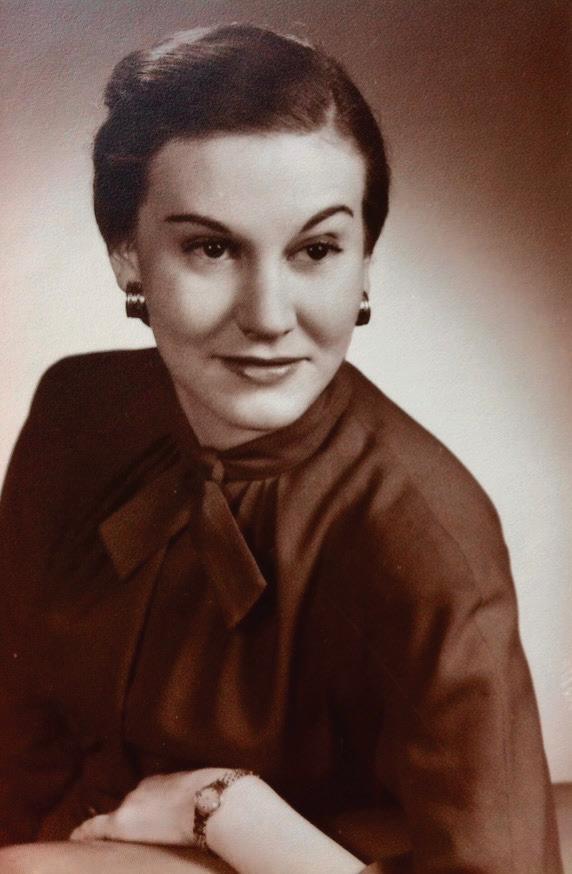
Rebeca Reiter Frankel, passed away at the age of 94 on June 13, 2025. She will be remem bered by her friends and family as a glamorous force of a woman who loved art and could draw you into a story. She was the beloved wife of the late Robert Frankel, with whom she shared 64 years of marriage. Born in Lima, Peru, on June 13, 1931, Rebeca was the youngest of four children and the only one born in Peru. Her siblings — the late Mina Roitman, Naftali Reiter, and Yeti Weisselberg — were born in Ukraine to their parents, the late Moiyes and Henica Reiter. Rebeca came to the United States at age 16, attending Cedar Crest College for a year before transferring to Carnegie Institute of Technology (now Carnegie Mellon University) to study acting. Her talent was quickly recognized, and she built an impressive résumé of leading roles on stage. During her senior year, she met Robert, the love of her life, and they married just three months later. Rebeca taught Spanish at The Ellis School and, after raising her children, became a docent at the Carnegie Museum of Art. She poured hours into studying the works in upcoming shows, and it showed. Her deep knowledge and theatrical flair brought the galleries to life for countless visitors. Her love of art and its history was a shared passion with Robert, who served on the museum’s board. Together, they were tireless advocates for expanding access to the arts and enriching Pittsburgh’s cultural landscape. Rebeca is survived by her children Dan (Debbie) and Janina (Rafi), her grandchildren Aaron, Erica and Mark Frankel, and her step-grandchildren Dana (Yuval) and Hagia (Tomer). She was also a step great-grandmother to Yonathan and Eli. Her spirit lives on in the family she cherished, the cultural institutions she supported and the city she so deeply loved. Services were held at Ralph Schugar Chapel, Inc. Interment West View Cemetery of Rodef Shalom Congregation. Contributions in Rebeca’s memory may be made to the Carnegie Museum of Art, 4400 Forbes Avenue, Pittsburgh, PA 15213 or City Theatre, 1300 Bingham Street, Pittsburgh, PA 15203. schugar.com
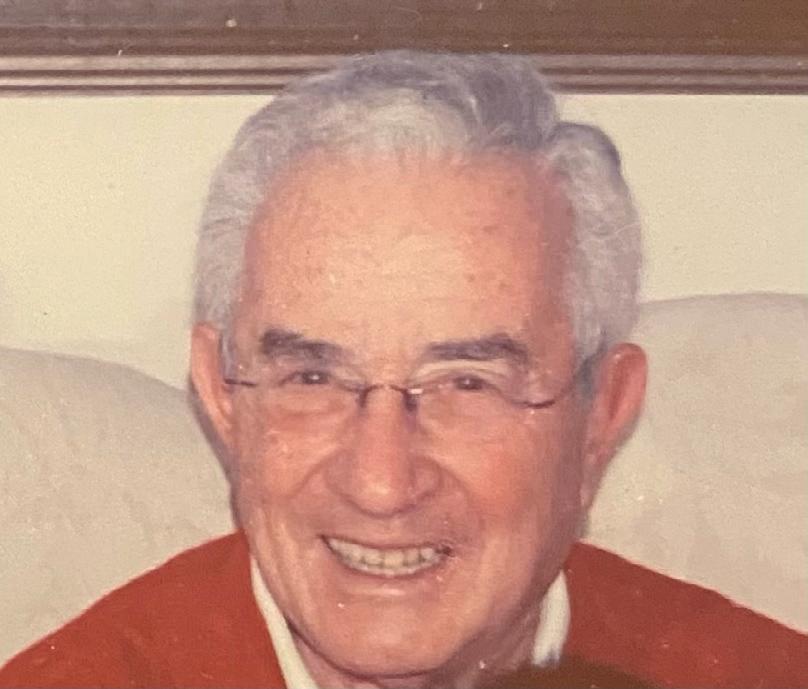

GOODMAN: Sandra Green Goodman, on June 12, 2025. Beloved wife for 65 years of Lee Goodman. Loving mother of Marne (Dr. Peter) Geller of Sarasota, Florida, and the late Stuart Goodman. Mother-in-law of Ellen Goodman Crawford (Randy) of Pittsburgh. Cherished grandmother of Andrew Geller, Joshua Geller, Samantha Goodman and Blake Goodman. Sandra graduated from the University of Pittsburgh and worked as a physical education teacher for over 30 years. She was active in many sports, including golf, tennis, swimming, pickle ball and skiing. Sandra and Lee were season members of the Pittsburgh Symphony Orchestra, and she was also a lover of dance. Sandra was a member of Rodef Shalom Congregation and Westmoreland Country Club. Graveside service and interment were held at Homewood Cemetery. Contributions may be made to Stuart Goodman Brain Cancer Memorial Fund at Hillman Cancer Center, UPMC Cancer Pavilion, Suite 1B, 5150 Centre Avenue, Pittsburgh, PA 15232 (hillman.upmc.com). Arrangements entrusted to Ralph Schugar Chapel, Inc. schugar.com

GOLDSTEIN: Dr. Morton Lawrence Goldstein, 92, of Pittsburgh, and Palm Beach, Florida, passed away on Saturday June 14, 2025, at his home in Pittsburgh. He was born on Nov. 11, 1932. Morton was a renowned physician heading up one of Pittsburgh’s premier medical practices for over 50 years, including being the president of his national medical fraternity. He was a loving and devoted husband and father. He served the community beautifully and was a mainstay of the Jewish community. Dr. Goldstein maintained a thriving gastroenterology practice, known for his compassionate and caring nature, gentle bedside manner and strong work ethic, regularly checking in on patients until well into the evening. Early in his career, house calls were routine. Morton is survived by his beloved wife of 60 years, Racelle Goldstein; his adored children, Michael (Sharon) Robinson, Catherine (Jason) Auerbach and Charles (Andrea) Goldstein; his sister Bernice Neft; and his grandchildren, Lilly Robinson, Winston Auerbach, Teddy Auerbach, Harrison Auerbach, Talia Goldstein, Rafi Goldstein and Kayla Goldstein. Throughout his life, whether with his family, in the hospital, by a patient’s side or on the golf course, Morton always had others in mind first and foremost. Graveside services and interment were held at Homewood Cemetery. Arrangements entrusted to Ralph Schugar Chapel, Inc. schugar.com


ORNITZ: Peacefully, on June 11, 2025, Ruth Friedman Ornitz, 96, of Delray Beach, Florida, formerly of Pittsburgh. Daughter of Louis K. Friedman and Fannie Hamburger Aaron Friedman. Sister of Jean (David) Nathan and the late Louis A. Friedman (the late Judy). Widow of Robert A. Ornitz. Mother of Carol Rehman (the late Aziz), Janet Ornitz, and Robert N. Ornitz (Lorri). Ruth grew up in Pittsburgh and attended Winchester Thurston and Vassar College. She was athletic and an accomplished sportswoman. She played golf from the men’s tees; with her partner she won the Western Pennsylvania Senior Women’s Doubles Tennis Championship; and she was an A.C.B.L. Life Master Bridge player, teacher and Duplicate Bridge director. She and Bob spent almost 75 years together traveling the world, playing golf, tennis and bridge, including sailing on more than 90 cruises. She had boundless energy, friends around the world, and she could never pass up coffee ice cream. She had a long and wonderful life.
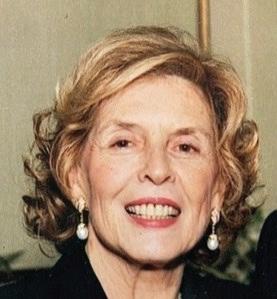
TABAS: Evelyn (née Rome) Tabas, June 13, 2025 (age 100), of Haverford, Pennsylvania. Devoted wife of the late Daniel M. Tabas; beloved mother of Lee (Nancy) Tabas, Linda (Murray) Stempel, JoAnn (Howard) Wurzak, Robert (Janine) Tabas, Carol Lynn Tabas and Susan Tabas Tepper; cherished sister of Dorothy Roberts and the late Marilyn Koeppel; devoted daughter of the late Bluma Fine Rome and the late Rabbi Dr. Sigmund J. Rome. Treasured grandmother of Brad, Elizabeth, Ted, Melissa, Adam, Jessica, Alex, Jake, Chelsea, Brittany, Chet, Lily, Greg, Max, Jason, Stephanie, Fitz, Major, Dagny and Baron, and 18 great-grandchildren. Evelyn was a graduate of Brooklyn College and the Cooperative School for Teachers, Bank Street, and a trustee of her graduate school, the Bank Street College of Education, New York. A lifelong learner, she returned to Bank
Please see Obituaries, page 20















Jewish Association on Aging gratefully acknowledges contributions from the following: A gift from ... In memory of...
Anonymous

Kopelson
Morton S Alman Esther B Alman
Marlene Alpern Nathan Shaer
Karen & Allison Brooke Broudy Bertha Broudy
Phyllis Cohen
Sheila Lawrence .
Robert Allen Cohen
Moskovitz
Harold & Cindy Lebenson Bertha Broudy
Rushie Leff
Jack & Bernice Meyers
Rebecca Leff
Louis Meyers
Linda Rattner Nunn Faye Bloom Rattner
Joyce Offerman
F Levenson
Linda & Jeffrey Reisner and Family Lawrence Brodell
Karen K Shapiro
Shapiro
Freda G Spiegel Sarah Perr Greenberg
Marlene Terkel
Silberblatt
Contact the Development department at 412-586-2690 or development@jaapgh.org for more information.
Sunday June 22: Eugene Bernard Barovsky, Norman L Berger, Bertha Broudy, Louis Cohen, Hyman
Danovitz, Hattie Kaufman, Dr J Kalman Leon, Emanuel Samuel Levin, Miriam Levin, David Levine, Esther Levine, Julius Moskovitz, Ruth Perlmutter, Fred Rosen, John J Roth, Louis Siskind, Clara S Sniderman, Mollie Weiss
Monday June 23: Mollie Apter, Erwin Becker, Barry Birner, Lena Caplan, Abraham Fink, Sarah Friedman, Sarah "Sandra" Goldberg, Arthur Klein, Eva Miller, Hyman Moravitz, Donald L Samuels, Louis Shapiro, Barbara Lucille Solomon
Tuesday June 24: Libbie Cohen, Benjamin Friedlander, Harold Goldstein, Diane Golbitz Hamilton, Louis Klein, Frank Kopelson, Lilian Miriam Krasik Kurtz, Max Marcovsky, Jean Smolevitz Marshall, Ethel Miller, Saul Oliver Neft, Maurice A Nernberg, Ethel Riesberg, Nathan Roth, Sarah Turk, Lawrence S Williams
Wednesday June 25: Celia Bergad, Rebecca Bluestone, Caroline Cooper, Tillie Gold, Shelton C Goodman, Henry E Hersh, Mollie Kramer, Celia Kweller, Martha Cohen Landy, Charlotte Leff, Helen Levin, Minnie Mendler, Morris A Robins
Thursday June 26: Esther B Alman, Beatrice Helen Amper, Sarah Rosenbloom Ronay, David Scholnick, Mildred Simon, Blanche Tarlo, William Wanetick
Friday June 27: Sally Berger, Bessie S Bernstein, Cecelia M Fink, Jacob Galanty, Simon Gastfriend, Sarah Leah Greenberg, Sadye I Horwitz, Sylvia Herman Kahan, Betty Stern Kaplan, Abe L Kessler, Harold B Levy, Dr Ben Moresky, Henry Norell, Max Rubin, William Bernard Segal, Morry Wise
Saturday June 28: Anna Alpern, William Brown, Ruth Tolchin Ehrenreich, Morris Finesod, Natalie Geminder, Emma E Gottlieb, Hyman Sanford Liebling, M D , Faye Bloom Rattner, Lois Recht, Sarah Hoffman Reifman, Sidney Schatz, Irving Schiffman, Esther Solomon








“It is our experiences that mold us into who we are … during times of adversity our true character will show.”


Obituaries
Obituaries:
Continued from page 19
Street, completing her master’s degree at age 75. Evelyn’s interest and concern for children has been a strong thread throughout her life. She was a board member of the former Teen-Aid organization in Philadelphia and was particularly interested in Children’s Hospital and Lankenau Hospital Service League. She served as honorary chairperson of the Gift of Time positive parenting program with the American Family Institute of Valley Forge and as an honorary director of United Cerebral Palsy of Philadelphia. A longtime supporter of Wills Eye Hospital and Federation Housing for Seniors, Evelyn positively impacted the lives of many. Evelyn was a member of the board of directors of Royal Bancshares of Pennsylvania and was a trustee of the Daniel M. Tabas Family Foundation. She was a longtime member of Temple Adath Israel of the Main Line. Evelyn had a powerful and enduring faith that sustained her throughout her long life. She imparted her sense of values, wisdom and of responsibility upon her children. As the matriarch of the family, her presence brought comfort and joy. She was by her husband Daniel’s side with love and support during the years of the growing hospitality, banking and real estate businesses. Evelyn was a lady of “quiet elegance,” the perfect complement to Dan as described in his biography “Shtarker.” Everyone who knew Evelyn will always cherish memories of her and continue her legacy to smile, love, live life and contribute to the happiness and well-being of others. Services were held Monday, June 16, at Adath Israel, 250 N. Highland Ave, Merion Station, PA 19066. Interment private. The family requests that contributions in her memory be made to Adath Israel of the Main Line. levinefuneral.com
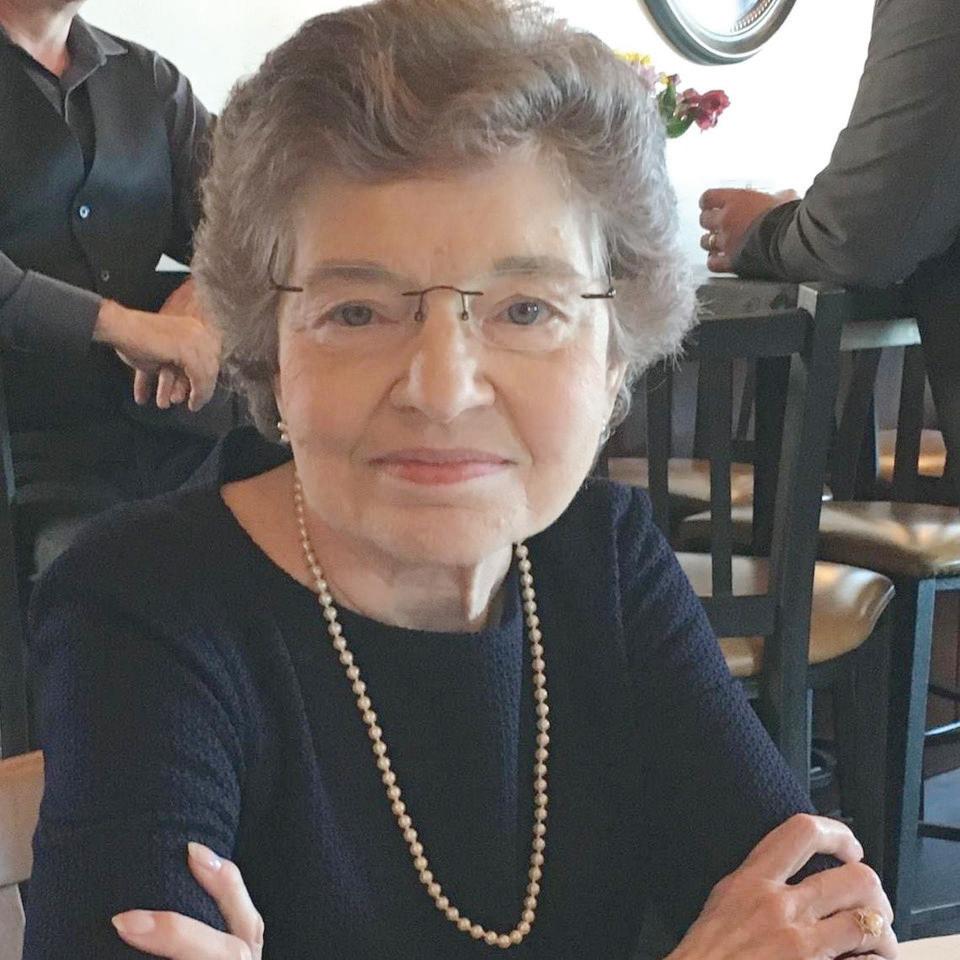
TRACHTENBERG: Natalie Trachtenberg, age 89, of Upper St. Clair, passed away on June 12, 2025. Beloved wife of the late Robert Trachtenberg of blessed memory. Loving mother of David Trachtenberg (Brenda) of Des Moines, Iowa, and Lynn Richards (Ronald) of Scott Township. Proud grandmother of Matthew Richards (Brittany), Jason Richards (Morgan), Jordan Trachtenberg (Dan Marincel) and Robin Gaussa (Neil). Great-grandmother to Sofia and Brooks Gaussa. Natalie was born in Philadelphia, an only child, to Marjorie and Harold Alexenberg of blessed memory. She graduated from Penn State University in 1957 with a BS Ed. A second-generation teacher; she taught high school French, English and social studies before devoting her time to being a stay-at-home mom. Once her children were older, she returned to the workforce as an employment consultant, spending her time coaching individuals on interviewing skills, advising on career goals and placing them with appropriate organizations. Natalie was always there to provide support, direction and wisdom to those around her and will be missed by friends and family. May her memory be a blessing to all who knew her. Services were held at Temple Emanuel of South Hills. Interment Mount Lebanon Cemetery, Temple Emanuel Section. Arrangements entrusted to Ralph Schugar Chapel, Inc. schugar.com




Oleinick
WEINSTEIN: Sherman G. Weinstein, on Saturday, June 14, 2025. Beloved husband for 30 years of Gloria Kaczynski Weinstein; loving father of Alan Weinstein, Heidi Marchese and Caryn Gale; step-father of Christine Rose Burton. Brother of Ralph, Brian and Spencer Weinstein. Proud grandfather of Leya, Mira, Daniel, Emma, Sophie, Julia, Rachel, Eli, Charina, Gloria, Daniel and Rachael. Also survived by 16 great-grandchildren. Sherman began his baking career at a young age. His love for creating delicious pastries, breads and cakes quickly blossomed into a lifelong vocation. He was the baker and proprietor of Weinstein’s Bakery in Stanton Heights and Morningside, Pastries Unlimited in North Hills, West View and Bloomfield, and Simple Treat Bakery on Murray Avenue in Squirrel Hill. Sherman dedicated his life to the art of baking, sharing his passion and talent with countless customers and friends throughout the years. His signature recipes, including his famous challah, cherry hamantaschen and decadent chocolate dream cookies. He brought joy to many celebrations. Beyond his baking prowess, Sherman was known for his generous spirit and kind heart. He often donated baked goods to local charities and schools, believing that food had the power to bring people together. His infectious laughter and warm smile made him a beloved figure in the community, where he was always ready to lend a helping hand or share a story. He always gave a chance to the underdog, changing the lives of all he helped for the better. He was an active member of Beth Hamedrash HagadolBeth Jacob Synagogue where he served as a past president and chairman of their cemetery. He was a former member of New Light Congregation and most recently was actively involved in the Shabbat minyan at Riverview Towers. Services and interment were held at Homewood Cemetery, Star of David Section. Contributions in Sherman’s memory may be made to the Jewish National Fund Trees for Israel campaign (JNF.org), or to the Jewish Association on Aging, 200 JHF Drive, Pittsburgh, PA 15217. Arrangements entrusted to Ralph Schugar Chapel, Inc., schugar.com PJC







Smith-Rosenthal Team
Jason A. Smith & Caryn Rosenthal
Jason: 412-969-2930 | Caryn: 412-389-1695 Jasonasmith@howardhanna.com Carynrosenthal@howardhanna.com







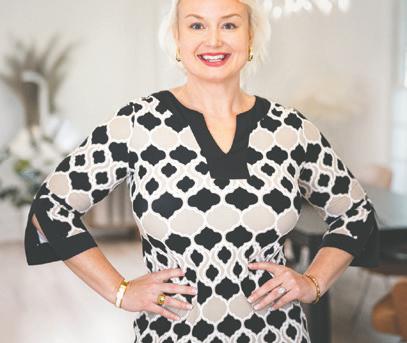










































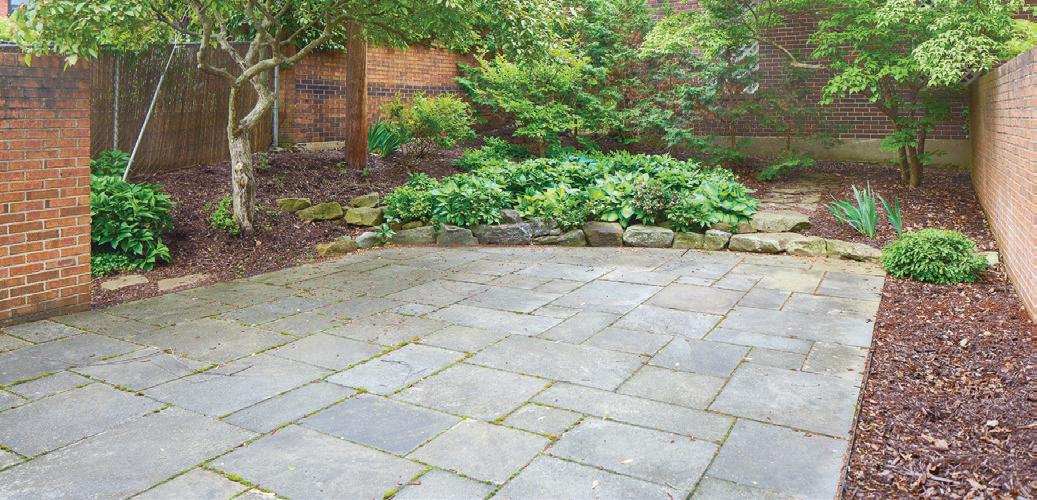



Life & Culture
70 years ago, these beach reads explained Jews to America
By Rachel Gordan | JTA
To read about American Jews this summer, you only need to open the newspaper. For better or worse, and probably for worse, Jews have been all too much in the news of late.
Seventy years ago, the situation was quite different. With World War II moving into the realm of history, in the mid-1950s Jews were being depicted not as alien or disrepu table immigrants but rather as members of a respected American religion, reflected in a middlebrow literary culture that reached a mainstream audience. That was true at the end of the 1955 beach reading season when an unlikely pair of popular novels made a splash on the New York Times Bestsellers list.
Patrick Dennis (the pen name of Edward Everett Tanner III) published his first novel, “Auntie Mame,” in August of 1955. “Mame” quickly reached number one on the fiction bestseller list. A few weeks later, Dennis’ novel ceded the top spot to Herman Wouk’s “Marjorie Morningstar.”

Other than featuring female protagonists whose name started with M, it was not obvious that the two books — one by a WASP from Evanston, Illinois, and the other by a Bronxborn Jew — had anything in common. Wouk’s novel followed Marjorie Morgenstern, a young Jew coming of age on Manhattan’s Upper West Side, and her adventurous dating life. Time magazine called Marjorie “an American Everygirl who happens to be Jewish.” The Morgensterns’ journey from the Bronx to Central Park West was not only the stuff of Jewish dreams; postwar Americans from all over the country could identify with their desire to move up in the world.
In Marjorie’s case, the family’s new home in the famous El Dorado building provided a feeling of luxury every morning when she woke to a sweeping view of Central Park. It was also the perfect address for launching a Manhattan social life — just as soon as she managed to disentangle herself from her old life and Bronx boyfriend. Readers follow as Marjorie negotiates her social and religious life, including observing kashrut.
The “will she or won’t she” question of the novel mostly concerns Marjorie’s virginity, but Wouk manages to tie the suspense to Marjorie’s keeping kosher. Bacon and eggs brunch at Tavern on the Green with her new uptown friends is just one of many hurdles confronting Marjorie as she figures out how to be a Jew in her new world. At the end of the story, the reader catches a glimpse of the heroine at 40. To an old beau who is visiting, this more mature Marjorie appears graying but otherwise recognizably herself. The real change is in her great loves, which are now family and Judaism. Once thrilled by the life her El Dorado address made possible, married Marjorie makes her home, more contentedly than ever, in Mamaroneck, Long Island.
With its message about the saving power of traditional family and religious values, “Marjorie Morningstar” seemed, to some readers, like the perfect antidote to “Auntie Mame.” Dennis’ protagonist is an avante garde
p Patrick Dennis’ first novel, “Auntie Mame,” reached number one on the fiction bestseller list in the summer of 1955. A few weeks later, Herman Wouk’s “Marjorie Morningstar” claimed the top spot.
Today Jews are distressed about the things that are said in public — and one need not turn to fiction to find the kind of attacks on American Jews that felt nearly impossible in this country in the decades immediately after World War II.
divorcee who celebrates her chosen family, delights in shocking the buttoned-down and, while presumably a Christian, has little use for religion. As the New York Times reviewer described Mame, “Though she reads [André] Gide in bed, to call her an intellectual would not be strictly fair to the intellect. Yet she is something more than a bohemian.”
Mame may have been, as novelist and playwright Paul Rudnick observed, America’s diabolical answer to Mary Poppins: She is a woman festooned in vibrant colors, feathery fringe and an elegant cigarette holder dangling from her fingers — anything that allowed her to stand out. But she was also a woman with a social conscience, teaching those around her to find the fun in life — and how to see the world, including its Jews, more empathetically. Only in the novel’s opening chapters does Mame appear as a spectacularly wrong choice to care for her suddenly orphaned nephew, Patrick. By novel’s end, Dennis has successfully convinced the reader we all would be better off with an aunt like Mame.
Both books were written by authors with something to say not only about their female protagonists, but about Jews in New York. In “Marjorie Morningstar,” Wouk revealed the compromises made by upwardly mobile Jews as religion became a tool for social climbing. Back in the Bronx, the Morgensterns belonged to an Orthodox shul, but the move to Manhattan requires adjustments, including joining a Conservative congregation. “The wealthiest Jews were Reform,” Wouk observes. However, “the Morgensterns were not ready for such a bold leap away from tradition, to praying with uncovered heads, smoking on the Sabbath, and eating pork. The Conservative temple
was a pleasant compromise with its organ music, mixed sexes, shortened prayers, long sermons, and a young rabbi in a black robe like a minister’s.”
While Jews are not central to “Auntie Mame,” Dennis’ novel nonetheless validates the notion that New York might just be a synonym for “Jewish”; one cannot escape Jews in this city and its environs. When Mame’s nephew Patrick proposes marriage to Gloria Upson, a young woman from the Upper East Side of Manhattan, Jews become part of the story in the person of his antisemitic future in-laws.
Mame, who lives chicly on Washington Square, is immediately suspicious of the Upsons’ Park Avenue address (“that graceless canyon of dying grass, carbon monoxide, and bad architecture”), which Mame finds unimaginative; she judges their furnishing gauche (“a little too B. Altman”). But it is not their sins of bad taste that truly offend Mame. It is their antisemitism.
When Mr. Upson discovers that New York Jews are planning to move next door to his Connecticut weekend home, he declares his intention to “keep these dirty kikes and all the rest of their lousy, stinking race out.” Shocked by his bigotry, Mame replies calmly with a lesson appropriate for mid-century Americans: “You can’t really be so naïve as to believe the Jews are a race… Why any anthropologist…” Mr. Upson can only reply: “Don’t give me none of your high-toned anthropology! I just know that as long as I have a breath left in my body I’ll fight every goddamned last one of these Izzys and Becky’s trying to muscle in on white man’s territory.”
Here, Patrick Dennis continued a trend typical of anti-antisemitism novelists of the
1940s who brought the anti-racialist lessons of Columbia University anthropologist Franz Boas and his students into the realm of popular culture. As the anti-antisemite of the story, modeling liberalism for her nephew, Mame responds with perfect retorts, such as when Mr. Upson rails at her: “You sit and talk like the New Republic or some parlor pink when another Christian faces a serious….” Mame interrupts him: “I wish you wouldn’t use the term Christian where it is so obviously misapplied.”
The Manhattan of “Mame” is a big, diverse city, with its share of boorish racists and sophisticated liberals. The enlightened, liberal Manhattanites of Dennis’ novel understand that Jews are members of a respected religion — not members of an inferior race.
These popular 1955 novels portray the Jewish situation from two different perspectives. “Marjorie Morningstar” depicts what the literary critic Leslie Fiedler called “the first fictional celebration of the mid-20th-century detente between the Jews and middle-class America.” “Auntie Mame” shows readers what is being said about Jews behind the closed doors of the Park Avenue dinner parties where Marjorie is not invited.
Today Jews are distressed about the things that are said in public — and one need not turn to fiction to find the kind of attacks on American Jews that felt nearly impossible in this country in the decades immediately after World War II. Even as Jews ascended America’s postwar socioeconomic ladder, moving from the Bronx to Central Park West, “Auntie Mame” made clear that not all Americans were cheering them on. In 1955, both trends were in evidence. Seventy years later, Jews continue to prosper, and the jeers have only grown louder. PJC
Image by Grace Yagel
Community
Sound of Jewish music
Chabad of Squirrel Hill hosted The Sound of Jewish Music. The June 9 event featured speeches, songs and performances from community members.
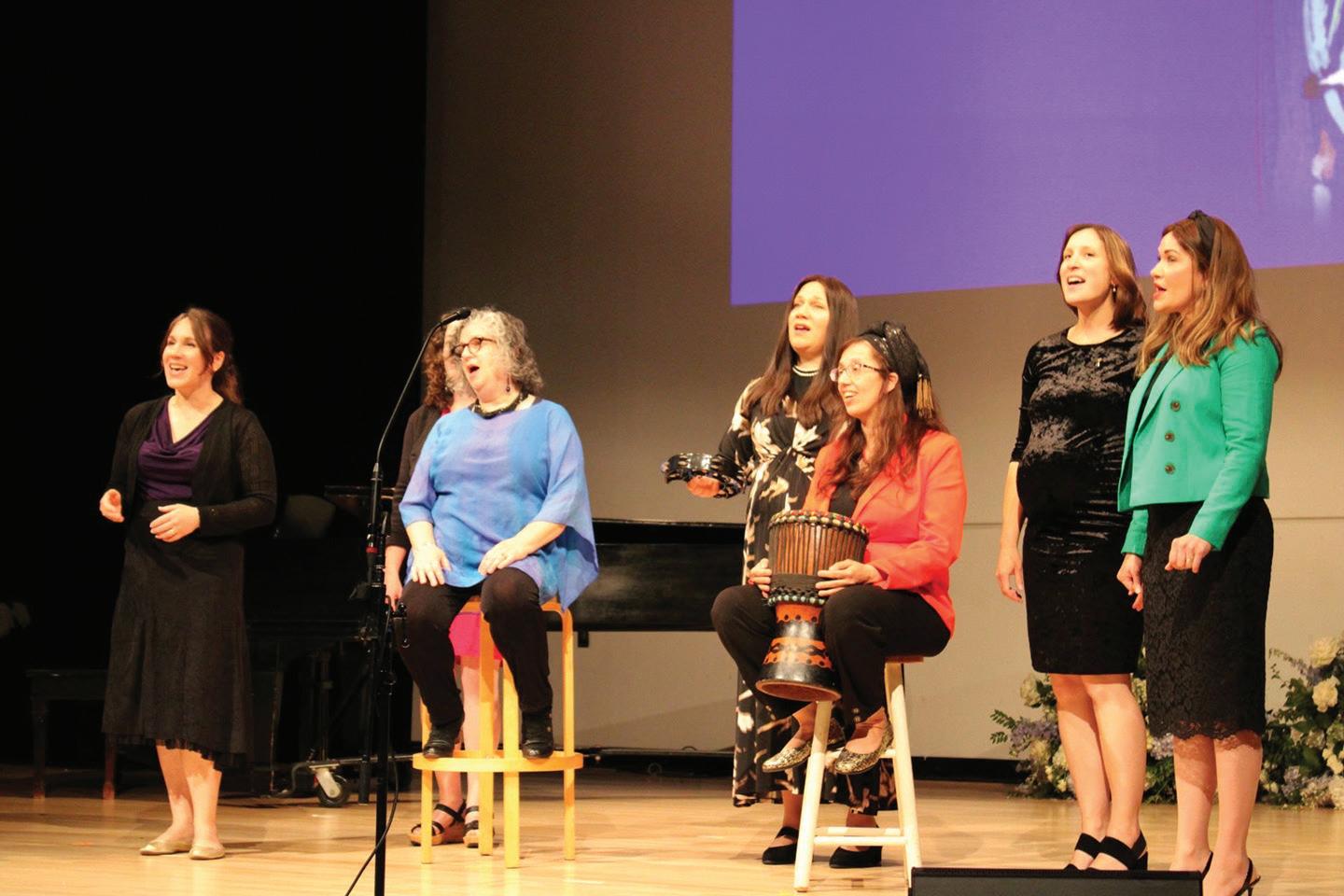

People peacefully assembling
All in the golden afternoon

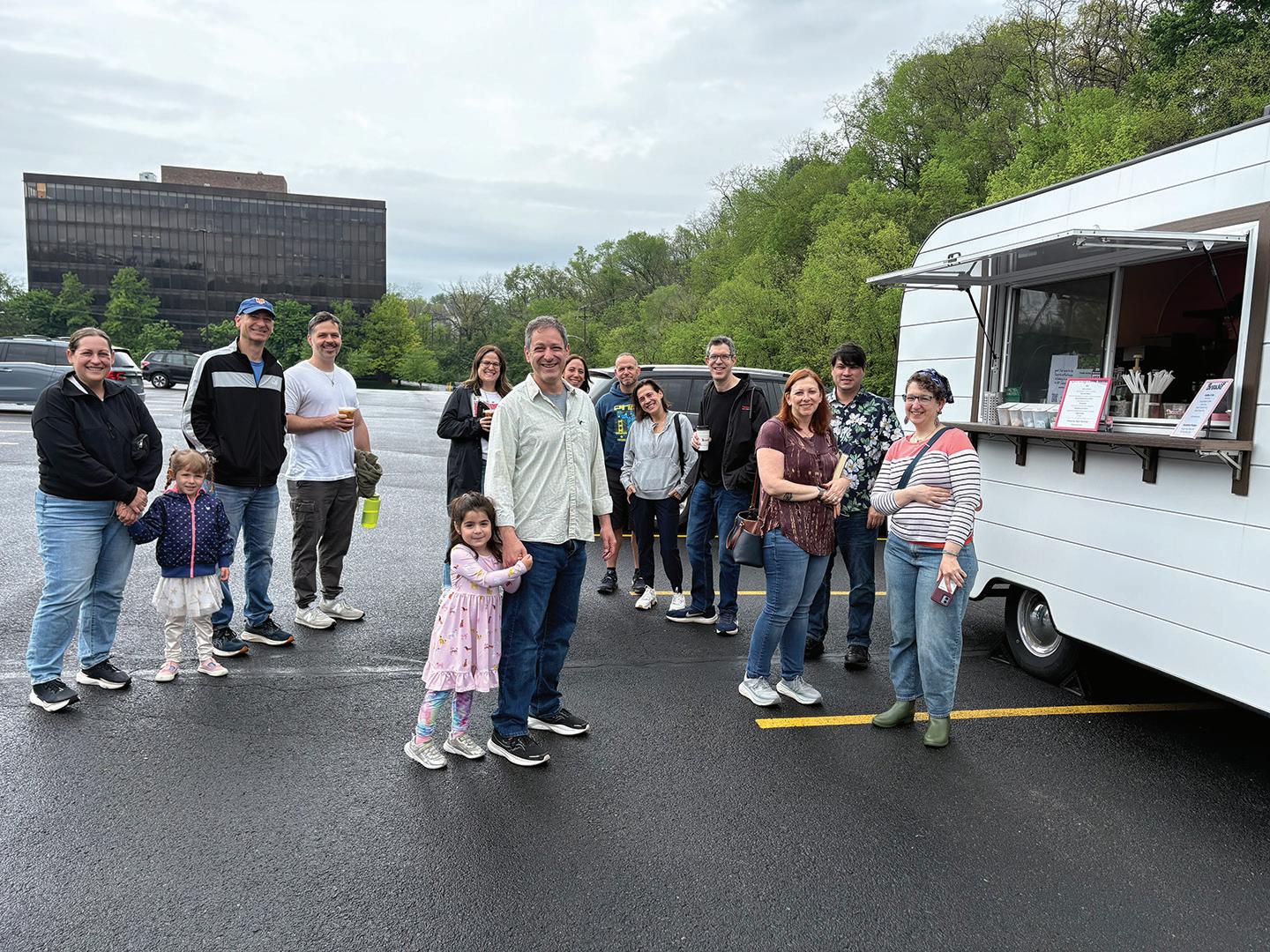

p Recognizing our readers
Macher and Shaker
Jennifer Brick Murtazashvili, professor in the School of Public and International Affairs and director of the Center for Governance and Markets at University of Pittsburgh, received a Fulbright U.S. Scholar Program Award from the U.S. Department of State and the Fulbright Foreign Scholarship Board. Murtazashvili will serve as distinguished scholar at Tel Aviv University in Israel, where she will study how formal agreements and informal networks shape regional cooperation in the Middle East, Central Eurasia and Eastern Europe.
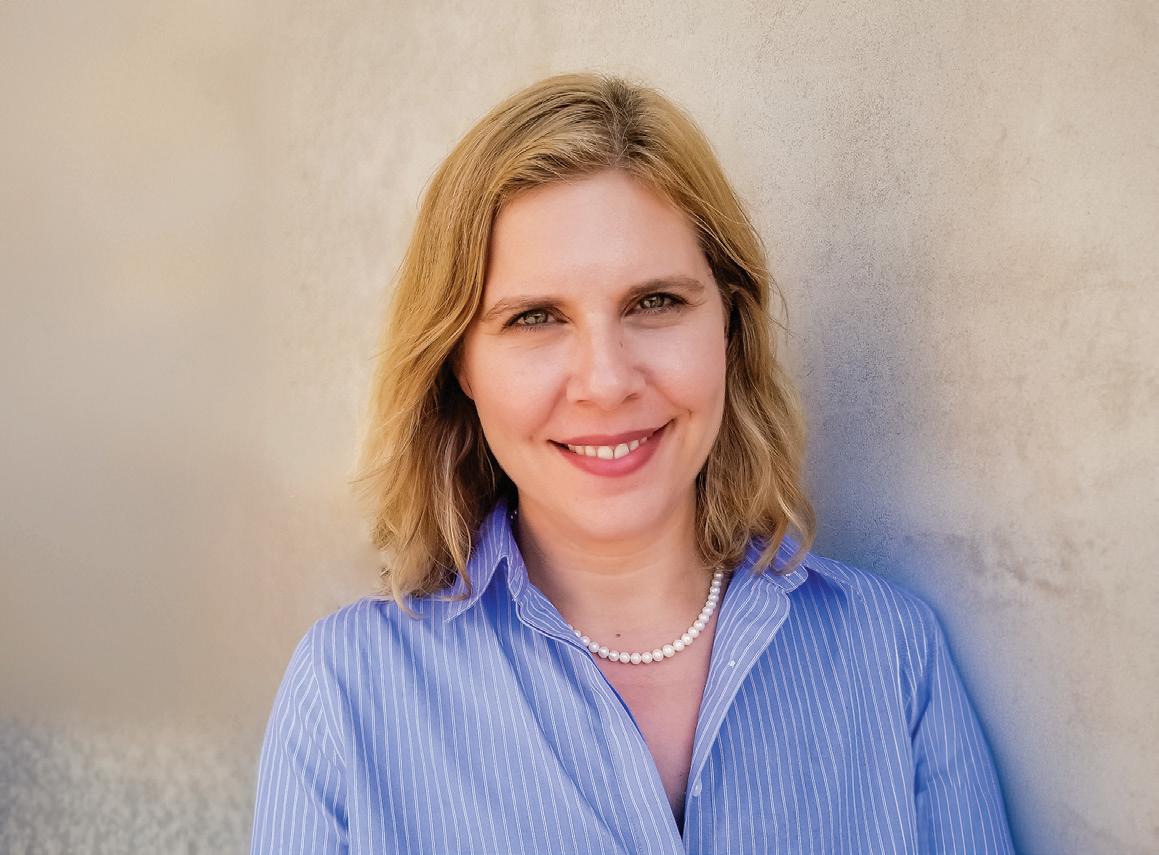
p Kol Shira performs on stage at the Jewish Community Center in Squirrel Hill.
p
Delivery of the Pittsburgh Jewish Chronicle was happily received by Weinberg Terrace residents.
Photo by Maureen Busis
p Jennifer Brick Murtazashvili
Photo courtesy of Jennifer Brick Murtazashvili
It takes two
Shortly before breaking for summer, Community Day
Photo courtesy of Community Day School
JCC School of Dance hosted “Alice in Wonderland Ballet & Magic Within.” The school-age dance recital was held on June 5.
p As much fun as a mad tea party Photo courtesy of Jewish Community Center of Greater Pittsburgh
• Volunteers must be 18 or older
• Volunteer for 4 hours, one day or whole week
For more information: Leah Gelman, Assistant Games Director, lgelman@jccpgh.org
















